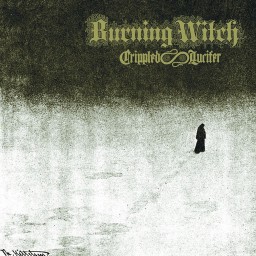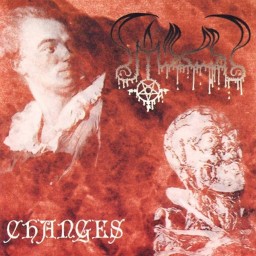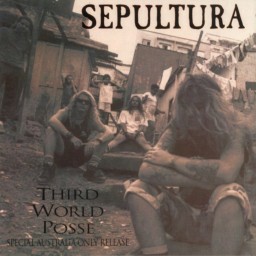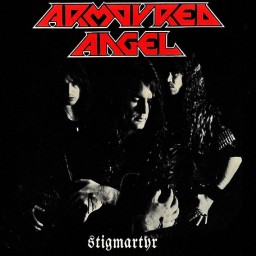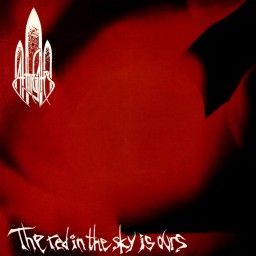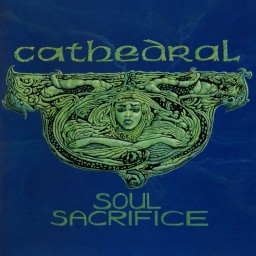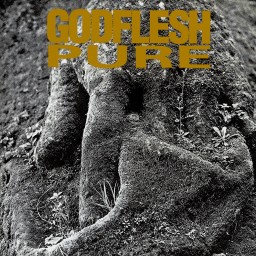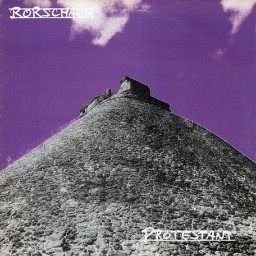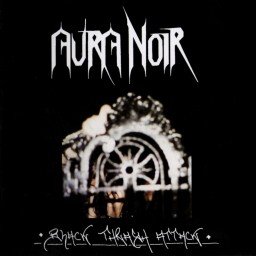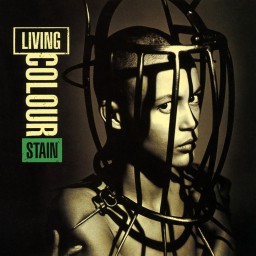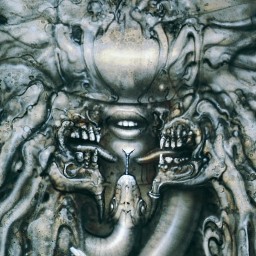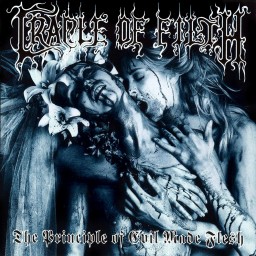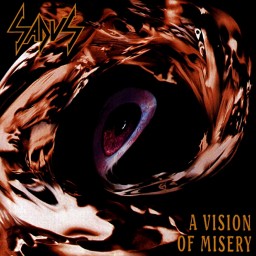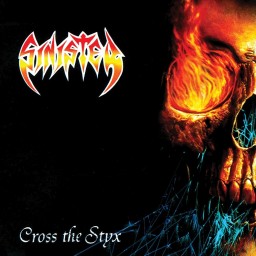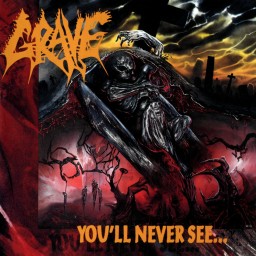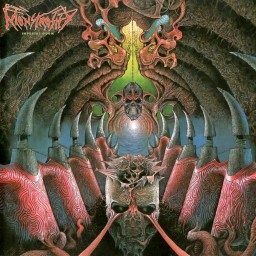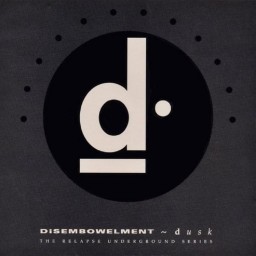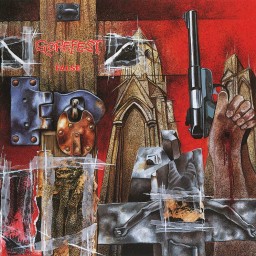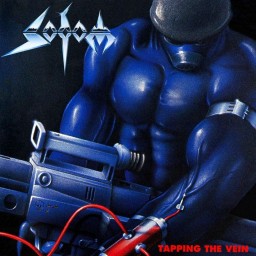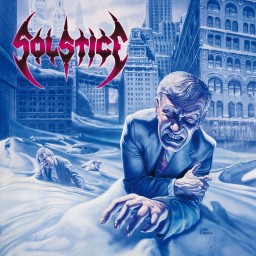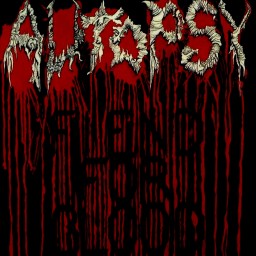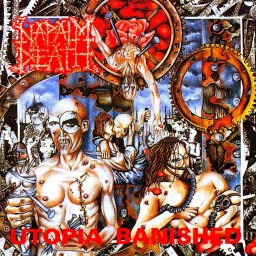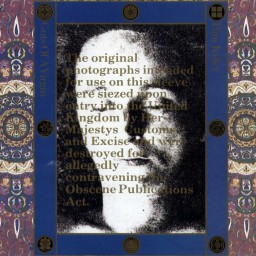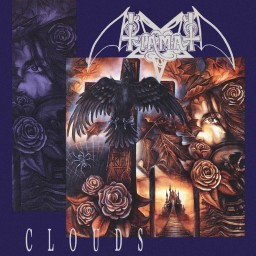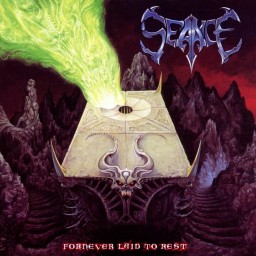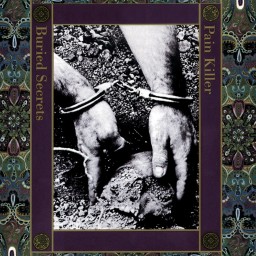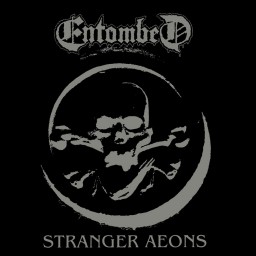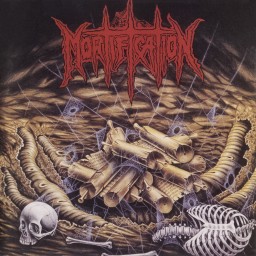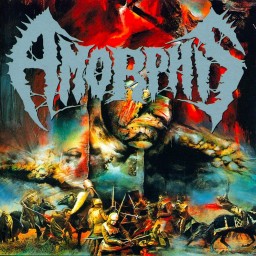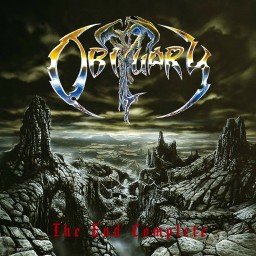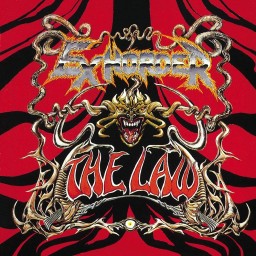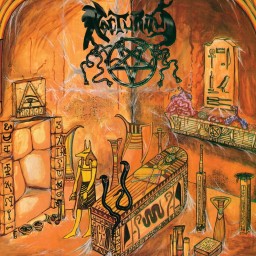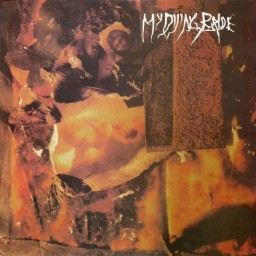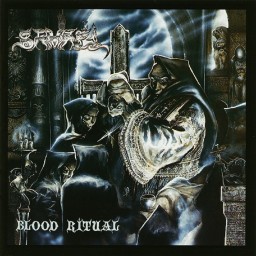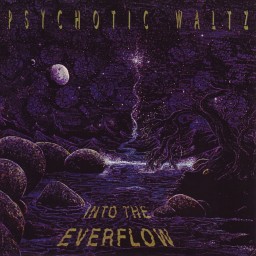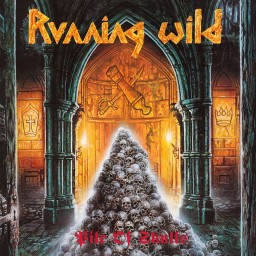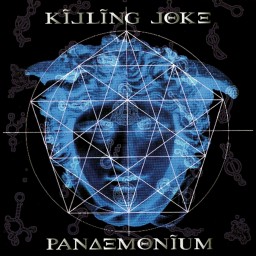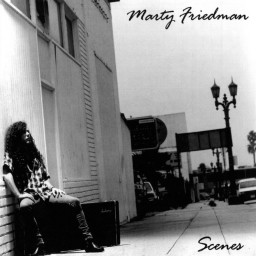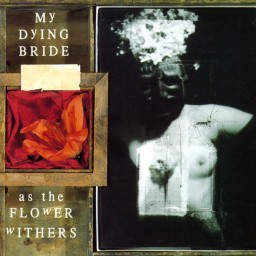Daniel's Reviews
Earlier this year I conducted an exercise whereby I made a dedicated attempt to identify the first five metal releases that converted me to the ways of darkness & the results (surprisingly) seemed to indicate that London legends Motorhead may well have been band #1 for me through their 1984 “No Remorse” compilation. Needless to say then that we’ve had as long a relationship as I can boast in metal terms. Interestingly though, I’d never heard any of Motorhead’s studio albums past 1987’s eighth full-length “Rock ‘n’ Roll” until this week when I investigated this month’s The Guardians feature release in 1993’s “Bastards” which is their eleventh full-length. Motorhead have never been a band that’s gonna make too many of my best-of lists but they are one that I hold an enormous amount of respect for & generally enjoy too with only their early self-titled & “On Parole” records not offering me some level of appeal along with 1980’s throw-away “Beer Drinkers & Hell Raisers” E.P. & the disappointing 1983 live album “What’s Words Worth?”. Everything else is at least worthy a few listens so, when a well-educated mate of mine recently mentioned that “Bastards” might be the release to finally convince me of Motorhead’s metal credentials, my ears pricked up & I made a conscious note to investigate it at some stage.
Upon first listen it became immediately obvious that “Bastards” is a very different sounding record to the other Motorhead albums I’ve partaken in over the years. The production job is much cleaner & more metallic with Phil Campbell & Wurzel’s guitar tones being thick & heavy & Mikkey Dee’s drum kit sounding sharp & precise. I have to admit that this caught me off guard a little at first because Lemmy’s bass guitar seems like much less of a protagonist in this environment & his vocals don’t seem as comfortable without the dirty grit that Motorhead made their calling card over the years. Repeat listens saw me overcoming this obstacle though & predominantly off the back of some quality hooks & song-writing.
My mate was 100% correct on “Bastards”. It’s by far the most metal release I’ve heard from Motorhead & a dual tagging is more than justified here. The album kicks off with the two most obviously metal tracks too with opener “On Your Feet Or On Your Knees” & speed metal stomper “Burner” both tearing shreds off the unsuspecting listener. The rest of the tracklisting sees Lemmy & co. consistently playing in that grey area between heavy metal & hard rock which often makes it hard to make a call one way or the other. That’s not to say that "Bastards" is a drastic stylistic departure for Motorhead though as you can still identify their bluesy roots easily enough during many songs & I never feel like I’m listening to anyone else.
“Bastards” is an extremely consistent album in many ways. The four-piece band sound like a well-oiled machine & it’s hard to imagine that they were capable of creating anything that was noticeably subpar at this stage in their evolution. The record is at its peak during the three-track run that contains “Burner” (my personal favourite), “Death or Glory” & “I Am The Sword” but “On Your Feet or On Your Knees”, “Bad Woman”, “Liar” & closer “Devils” are really solid too. In saying that though, I’ve always struggled to see Motorhead challenging for my higher scores & nothing has changed in that regard. I just don’t think they appeal to me enough from a purely stylistic point of view & that limitation sees me unable to claim any of the twelve songs as genuine classics, despite all of them offering me a level of enjoyment.
Nonetheless, “Bastards” has really surprised me this week. I wasn’t expecting it to challenge some of Motorhead’s more famous releases for top honours but that would seem to be the case here with only “Overkill” & “Ace of Spades” sitting above it on my Motorhead pecking order now. Don’t be afraid kiddies. This is a high-quality metal release in its own right & is one that’s deserving of essential status in the context of Motorhead’s illustrious career too.
For fans of Venom, Tank & Girlschool.
Genres: Heavy Metal
Format: Album
Year: 1993
Despite all my years of committed exploration into the metal genre, it still has a habit of surprising me quite regularly with releases that I've thus far overlooked but that very much demand to be heard. The 1998 compilation album "Crippled Lucifer" from Seattle's Burning Witch is one of the better examples of that concept that you're gonna find as it's a fucking pearler. Burning Witch were formed out of the ashes of death doom metal act Thorr's Hammer (whose 1996 "Dommedagsnatt" demo tape I'm a big fan of) & included the legendary Stephen O'Malley (Sunn O)))/ÄÄNIPÄÄ/Gravetemple/Khanate/Pentemple/Teeth of Lions Rule the Divine/Thorr's Hammer/House of Low Culture) on guitar & George Stuart Dahlquist (Asva/Sunn O)))/Goatsnake) on bass with Brad Mowen (Asva/Cryptic Slaughter/Lesbian/The Accüsed) & Jamie "Boggy" Sykes (Thorr's Hammer/Atavist) sharing the drumming duties on this release. The two 1998 E.P.'s that these individuals combined to create on this CD ("Rift.Canyon.Dreams" & "Towers") both offer a sound that's so cold & oppressive that it leaves virtually no hope left for humanity or existence in general.
The version of the release that I've explored kicks off with three of the four songs from the "Rift.Canyon.Dreams" E.P. which is probably the stronger of the two as far as I'm concerned, particularly because the first two tracks "Warning Signs" & "Stillborn" are utterly magnificent, virtually perfect examples of doom/sludge metal with hints at the band member's subsequent drone metal projects. The "Towers" E.P. is more solid than it is mind-blowing but it still contains an absolute beast of a song in "Tower Place" which I've also been forced to place in my Hall of Metal Glory, such is its immense weight & intensity. The production job could not have been better for this style of music with the thick & heavily down-tuned guitar tone sucking me in & slowly crushing me under its pure desolation & I'm often reminded of Melvins sludgier material. The vocals swap between a clean Electric Wizard style doom metal delivery & a savage & visceral hardcore one. I have a preference for the latter but I don't think this release would be what it is without the balance that's provided by having both.
Honestly, it was a big mistake to keep this CD at arm's length for so long as it's everything it's cracked up to be. The quality levels never dip below four-stars & there's a class in the execution that belies the pedigree of the artists in question. I fucking love this shit just quietly.
For fans of Thou, Cough & Sunn O))).
Genres: Doom Metal Sludge Metal
Format: Compilation
Year: 1998
This one-off album from Austrian death metallers Miasma slipped under most people's radars back in the day but made a significant impact on a teenage me when I was lucky enough to pick it up from one of my tape trading associates at the time. It offers just the sort of stuff that made the tape trading scene so great with Miasma showcasing a very clear understanding of the death metal ethos. They certainly don't rely on technical skills or precision, instead focusing all of their attention on atmosphere which is majorly enhanced by one of the filthiest guitar tones you'll ever heard & some of the most brutal death growls in existence. This is dirty, sloppy & repulsive death metal for death metal purists only & I, for one, are still well & truly down with this sort of shit. The doom metal infused sections are particularly suffocating & a unanimously positive way. My only criticism is that the album fades away a bit in the back end with the tracklisting being noticeably top heavy.
For fans of Molested, Infester & Rottrevore.
Genres: Death Metal
Format: Album
Year: 1992
By 1992 Brazilian thrash metallers Sepultura had quite literally changed the world, at least as far as the then-struggling thrash metal genre went. A commanding grunge rock wave had all but washed away the once thriving thrash metal scene with most of the more senior bands now resorting to dilution in order to stay afloat but these four heroes from Belo Horizonte had managed to not only stay afloat but to give the thrash world the shot in the arm it so sorely needed. I first discovered Sepultura through their classic 1989 third album "Beneath The Remains" & quickly indulged in their much rawer earlier material, all of which I really enjoyed. 1991's inspired "Arise" album hit me for six &, in doing so, almost managed to match "Beneath The Remains" (which still sits in my top five for the thrash metal genre overall to this day) for sheer class. So, needless to say that when I heard that Sepultura were coming to my hometown of Sydney in 1992 it saw my excitement levels reaching a fever pitch. The fact that these foreigners felt the occasion was significant enough to warrant a dedicated Australian tour E.P. left a 16 year-old me feeling somehow special so, despite the fact that "Third World Posse" didn't contain much in the way of new original material, I picked it up on CD as soon as it was released & indulged in it consistently throughout the next few years too. It's been eons since I've listened to it now but I thought I'd keep my obsessive completist urges at bay by giving it a revisit this week.
"Third World Posse" is a five-track, fifteen-minute E.P. that acts as somewhat of an extended single that's built around one of Sepultura's most popular songs in "Dead Embryonic Cells" which was drawn from the "Arise" album. It's backed with a cover version of Dead Kennedy's "Drug Me" & three live recordings that would appear to be taken from the same Barcelona show that made up the outstanding 1992 live video "Under Siege (Live at Barcelona)" which I also bought. While I've always been a big fan of "Dead Embryonic Cells", I have to admit that I've never felt that it was one of the strongest tracks on "Arise" & don't think of it as the classic that most people seem to. It's certainly a very solid inclusion though & it has the desired effect in kicking off an E.P. which was obviously intended to draw in a new audience through a fairly cheap release that coincided with their tour. Sepultura's version of "Drug Me" is also very impressive, coming across as a high-octane crossover thrash assault that's chock-full of energy & aggression. The three live cuts are all of a very high quality too to be honest with the magnificent "Inner Self" from the "Beneath The Remains" album unsurprisingly representing the highlight of the EP. "Troops of Doom" had been given a tidy-up during a session that took place in August 1990 & the version we receive here is much more in line with that re-recording than it is with the youthful enthusiasm of the original that appeared on Sepultura's 1986 debut album "Morbid Visions". It's a really good thrash song in this format too & it isn't let down by the closing track either, a very successful heavy metal cover version of the title track from Motorhead's 1986 "Orgasmatron" album that sees the band taking the song in a slightly different direction & one that saw it taking on a whole new personality.
So you see, while "Third World Posse" may not offer anything terribly new for the more experienced & obsessive fans out there, it certainly served its purpose very well. For me personally, it acted as somewhat of a calling of the guard before one of the live shows that I've placed at the very top rung of my metal experiences over the years. Sepultura may never have been the same after that tour but I guess those days can never be taken away from me & I'd encourage anyone that has similar feelings about Sepultura's peak period to give this E.P. a couple of listens, if only for old time's sake. For those that are new to the band but have been lured into the thrash world by bands like Slayer or the gods of the Teutonic scene like Kreator & Sodom, this record should also offer plenty of appeal to you as well & will no doubt open up a brand-new can of worms for you too.
Genres: Thrash Metal
Format: EP
Year: 1992
Canberra death metallers Armoured Angel were very much a local icon during the late 1980's & the whole of the 1990's. They're often touted as being the very first Australian extreme metal band which is probably a little debatable given that they started out as a more traditional heavy metal band & with a very different line-up to the one that was at least partially responsible for pushing the death metal genre in this country. Armoured Angel's first demo tape "Baptism in Blood" (released way back in 1985) is a showcase of those early attempts at heavy metal but it wasn't until 1989's "Wings of Death" & 1990's "Communion" demos (both fairly iconic releases in this part of the world) that we'd see them blazing a trail through the world of thrash metal. That transition would take its next logical step with their first proper release though & it would see Armoured Angel properly defining the sound that would make them arguably the most celebrated of all Australian death metal artists. The highly regarded four-song "Stigmartyr" E.P. would see the light of day in 1992 & would ultimately go on to become the jewel in Armoured Angel's crown.
I had the pleasure of witnessing Armoured Angel in a live environment on many occasions over the years, an experience that was invariably rewarding & was generally a fairly significant event in the Sydney metal calendar too. Their uncommon three-piece setup was a touch unusual with drummer Joel Green handling the vocal duties & allowing guitarist & brother Matt Green & founding member & bassist Glen "Lucy" Luck to front the stage either side of him. The most memorable event I can recall was an infamous night at the Phoenician Club where Armoured Angel & fellow Aussies Destrier blew Florida's Satanic heavyweights Deicide off the stage on their "Once Upon The Cross" tour but that's a story for another time. The point I'm trying to make here is that the release of the "Stigmartyr" E.P. was highly anticipated by the local metal community which saw me picking up a CD copy immediately upon release. It didn't muck around in making an impression on this aspiring 16 year-old metal musician either & I'd suggest that it played an important role in convincing me that I needed to form my own death metal band. I mean, if these three dudes from Canberra could make a CD that was of a world class standard then so could I, right?
For all of its influence & celebration at a local level, the "Stigmartyr" E.P. is only a very short overview of where Armoured Angel were at at the time with the four song tracklisting only amounting to a mere fifteen minutes in duration. It's the consistent quality of those fifteen minutes that matters here though with all four songs being worthy of your attention. "Stigmartyr" saw Armoured Angel maintaining some of their previous thrash metal tools but utilizing them within a death metal context. It's by no means the most brutal death metal release you'll ever hear but that's not the intention either. This music is all about atmosphere with repetition being used to create tension & with subtle changes creeping in over time. The riffs are kept fairly simple but the band are a tight-knit unit by this point & execute them splendidly. Joel's vocals possess a whispery quality that's always intelligible & gives Armoured Angel a level of accessibility that's not afforded to all death metal acts. His beats are kept quite basic & uncluttered which allows the hooks in the riffs & song-writing to really dig their teeth in & also keeps life as a drumming front man fairly easily achieved in a live environment. Probably the only weakness is with Matt's guitar solos as they're not terribly sophisticated & their pentatonic melodic structure doesn't exactly accentuate a death metal atmosphere. His rhythm guitar sound is nice & thick though which gives the riffs plenty of weight.
The E.P. kicks off beautifully with opener "Hymn of Hate" being a very solid example of what you can expect from "Stigmartyr". It's closely followed by "Beyond the Sacrament" which is comfortably the least impressive of the four songs but is still pretty decent before the title track steps the aggression up a bit, showcasing an early Morbid Angel influence along the way. It's the brilliant closer "Ordained in Darkness" that's the real gold here though, showcasing a clear understanding of dynamics & building a trance-inducing soundscape of darkness in the process. It's an amazing journey in my opinion & I've always regarded it as one of this countries most important metal songs. That's not to scoff at the other three mind you. These four tracks are all built on an accomplished understanding of song-writing concepts with the composition being tailored to highlight the hooks. That's right... I said "hooks"... in death metal... You see Armoured Angel are all about them in a similar way to English death metal masters Bolt Thrower who are probably the band that I most closely associate with the Armoured Angel sound given their mutual penchant for repetition & melody within what are still essentially death metal riffs.
Sound interesting? Well, it should because this is not Australia's premier death metal release for no reason with all of Armoured Angel's post-"Baptism in Blood" releases being high quality representations of Aussie death metal. If you enjoy some of our other bands like Slaughter Lord or Mortification then you owe it to yourself to check out "Stigmarytr" too.
Genres: Death Metal
Format: EP
Year: 1992
Although most of the world were first exposed to Swedish melodic death metal legends At The Gates through their undisputedly classic 1995 fourth album "Slaughter of the Soul", it would be their 1992 debut full-length "The Red in the Sky is Ours" that would first bring them to my attention back in the early-to-mid 1990's & I recall really enjoying the experience too with the record receiving a number of repeat visits. This was a very different At The Gates to the one that would explode across the globe a few years later but I had none of that future context at the time which I think helped me to understand the record more than someone that would try to go back to it after having been converted by the wonderful "Slaughter of the Soul" which I still regard as the pinnacle of the melodeath sound to this day. I also have some unusual opinions on "The Red in the Sky is Ours" that I think hold some merit & need to be heard so let's take a look at it in a little more detail.
At The Gates' debut album is a fairly raw death metal album that possesses a lot of street credibility for a number of reasons but the production job is actually pretty clean which makes the fairly complex compositions easily decipherable. The rawness comes more from the vocals & performances which keep "The Red in the Sky is Ours" firmly in the underground. Most pundits will have you believe that At The Gates' debut was simply a classic old-school death metal album but I have to disagree with that claim as there's much more to it than that. The arrangements are so erratic yet also so sophisticated that I'm constantly left feeling like I'm listening to a technical death metal release & there's a very clear reason for that. "The Red in the Sky is Ours" is very obviously an attempt to emulate Atheist's classic "Unquestionable Presence" sophomore album in my opinion with a lot of the tools being utilized having been clearly borrowed from the Florida tech death legends. Take the basslines of Jonas Björler (The Haunted) for example which often attempt to pull off similar flourishes of technicality with the guitarists opting for similar layers of melodic counterplay too, occasionally hinting at the melodic death metal sound that they'd play a huge role in developing over the coming years although never consistently enough to justify the claims that "The Red in the Sky is Ours" is a legitimate Swedish melodeath release. The one element that At The Gates can't manage to replicate is the musicianship though which sees them offering a much looser outcome. Don't get me wrong, these guys can certainly play but pulling it all together tightly in the studio is another thing altogether. Strangely though, this seems to work for At The Gates here as it gives the album an additional layer of authenticity, the sort that the underground tape trading scene was built on & one that I very much understand. The vocals of Tomas Lindberg (Lock Up/Disfear/The Lurking Fear/Grotesque/Liers in Wait/The Crown) are also extremely raw & don't sound anywhere near as polished as they would soon become which only adds to this underground atmosphere. There's an unhinged madness to his rabid delivery which isn't as accessible as we'd hear from him on later efforts & leaves him as the weaker link in the early At The Gates chain in my opinion.
"The Red in the Sky is Ours" is a very consistent record as I don't think there are any weak tracks included as such. There aren't any absolute belters either but there are just enough very solid death metal numbers to see me thoroughly enjoying the outcome nonetheless. The one-two punch of my personal favourite "Within" into the equally strong "Windows" is probably the best part of the record although I also really enjoy the title track, "Neverwhere" & the end of the album which is made up of the highly progressive "Night Comes, Blood Black" & "City of Screaming Statues", a track that was also included on At The Gates' excellent 1991 "Gardens of Grief" demo which fans of the band should really check out.
But where does "The Red in the Sky is Ours" sit in the overall At The Gates back catalogue then? Well, I'm not gonna surprise anyone by suggesting that it eclipses "Slaughter of the Soul" as that's simply not the case but I don't actually think it's all that far behind it terms of how much appeal it offers me. I've never been the biggest fan of melodic death metal so the more technical death metal approach of the debut is more in line with my usual musical preferences which, I'll admit, gives it a little bit of an advantage over At The Gates' other records & perhaps that's the reason that I've always considered it to be their second-best release. For those that have always had similar battles with the melodeath subgenre to myself, don't let that discourage you from giving "The Red in the Sky is Ours" a few runs because it holds some very different cards & I tend to associate much more closely with bands like the afore-mentioned Atheist, fellow Swedes Liers in Wait & the more technical melodeath artists like Arsis than I do a Dark Tranquillity or In Flames. Whatever you call it though, it deserves to be heard & shouldn't be left lurking in the shadows while "Slaughter of the Soul" takes all of the spotlight.
Genres: Death Metal
Format: Album
Year: 1992
Coventry stoner doom masters Cathedral's debut album "Forest of Equilibrium" absolutely floored me back in 1991. I simply found it so refreshing to hear a record that was so inspired by the past yet presented its influences in a way that sounded entirely fresh & which contained so much depth. It certainly helped that it's one of the doomiest records I've ever heard in my life as I'm sure you all know of my passion for gratuitous waves of deep audio oppression by now. I'd purchase "Forest of Equilibrium" on cassette shortly after it was released & it would immediately become a life-long favourite of mine. I'd frantically go hunting for more of this sound too which would lead me to Cathedral's marvelous 1990 "In Memorium" demo tape which I also regard as a genuine doom metal classic. That would unfortunately have to do me for a while, that is until Earache Records released their "Gods of Grind" compilation CD the following year, a release that included E.P.'s from Carcass, Entombed, Confessor &... what do you know, huh? A new Cathedral E.P.!!
Contrary to popular opinion, the "Soul Sacrifice" E.P. wasn't recorded during the "Forest of Equilibrium" sessions, instead being laid down in January 1992. The version of "Soul Sacrifice" that appears on the E.P. is slightly different to the one that I regard as being the only real blemish on the debut album. The differences don't leave it commanding a different response from me though I'm afraid. I simply can't get into that more chuggy, up-tempo & groovy stoner metal shit. The other three songs are all brand new which left me with considerable excitement. Sadly though, two of the three take a similar musical direction to the title track so I find myself struggling with both "Golden Blood (Flooding)" & particularly "Autumn Twilight". Lee Dorrian's heavily pitchy vocal stylings are done no favours by this material either. Thankfully though, the remaining song "Frozen Rapture" is an absolute doom metal monster of the most epic proportions imaginable. In fact, it's seriously one of the greatest examples of the genre I've ever heard in my life & I can't imagine why it never managed to make it onto a full-length album. Sure, there's a short stoner metal groove riff accompanied by s cheesy cowbell about two thirds of the way through the song but it's all over very quickly with things returning to pure desperation & depression. I can't tell you how life-changing this song has been for me across my life. It still gives me chills to this day.
So, the "Soul Sacrifice" E.P. sounds fairly inessential really, doesn't it? It kinda says something that I find it to be comfortably the weaker of the four E.P.'s on the "Gods of Grind compilation too but "Soul Sacrifice" falls into a fairly unique bracket of releases for me in that it can genuinely be carried by the one stunning piece, despite the fact that I get very little out of the remaining inclusions. It's also worth mentioning that the online consensus that the E.P. is a doom metal release is overly ambitious given that three of the four songs clearly fall into the groovy stoner metal camp. "Golden Blood (Flooding)" has a fantastic doom section towards the end that sits right up there in the top echelon of the genre but sadly it's wasted on a lengthy track that spends far more time in Groovetown. I'm sure stoner nuts that bow down at the altar of bands like Sleep, Church of Misery & Orange Goblin might have less of a problem with this material than I do but I still don't see "Soul Sacrifice" competing with the better releases from the stoner metal genre. It's merely an inessential platform for Cathedral to showcase one of its finest moments in my opinion so I'll always keep the CD handy, even if I might use the skip button a few times (often to return to the start of "Frozen Rapture" for another run).
Genres: Doom Metal
Format: EP
Year: 1992
While I wouldn't ever suggest that industrial metal is one of my favourite genres, there are plenty of artists from within that realm that appeal to me but none of them come close to the sheer class & inventiveness of Birmingham's Godflesh who were at least partially responsible for birthing the genre in the first place. I fell hopelessly in love with Godflesh through their classic 1989 debut album "Streetcleaner" which saw me quickly investigating their seminal 1988 self-titled E.P., a release that soon proved itself to contain some similarly masterful material. I'd subsequently get onboard with 1991's stunning "Slavestate" & very solid "Cold World" E.P.'s as soon as they hit the streets as well as Godflesh's brilliant "Slateman" single in what was an imposing initial run of amazing releases that saw Ben & I thoroughly obsessing over Godflesh during the first half of the 1990's. 1992's "Pure" sophomore album would play a large role in that obsession too after I picked it up on cassette shortly after release.
"Pure" sees band leader Justin Broadrick (Jesu/Fall of Because/Napalm Death) embracing his experimental side by further incorporating elements he'd hinted at in the past to create a record that very much owns its own unique identity. It's calling cards come in the form of its repetitive, draw-out song-structures & abrasive layers of guitar work, both of which would provide the inspiration for the post-metal genre that would be developed in the coming years. The heavily hip hop-inspired drum programming & crushingly heavy basslines of G.C. Green (Fall of Because) are perhaps even further accentuated than on past releases with the atmosphere reflecting the coldness of the magnificent cover artwork beautifully. Broadrick's vocals now alternate between a hardcore-ish bark & a wispy & intentionally pitchy clean delivery that has remained with him throughout his career.
"Pure" is not an immediate release by any stretch of the imagination as it can take some time to open up, even upon return visits. It can be most closely associated with 1991's "Cold World" E.P. given that they were both recorded in the same session. There's not even anything that hints at being a weaker track on the lengthy 80-minute tracklisting with some of Godflesh's strongest material being scattered evenly across the album to reward the patient listener for their committed attention. The heavily dance music-inspired "Mothra", the post-rock infused "Don't Bring Me Flowers" & the enormous 21-minute dark ambient closer "Pure II" are simply devastating & represent my personal highlights while some of the other more significant tracks like "Predominance" & "Monotremata" also tick all of my boxes to qualify for classic status.
While 1989's "Streetcleaner" is perhaps destined to remain the pinnacle of Godflesh's illustrious back catalogue for all eternity (closely followed by the underrated "The Earache Peel Sessions" E.P. for me personally), "Pure" doesn't sit all that far behind in my opinion. In fact, I'd suggest that it slightly surpasses the self-titled & "Slavestate" E.P.'s in my esteem these days, comfortably eclipsing "Cold World" too. It's a marvelous example of what true industrial metal music can achieve. You know... music that simply sounds & feels like it's been created by layering samples of factory sounds over the top of each other to create a dark & brooding atmosphere? Godflesh did this better & far more consistently than anyone else during the first half of the 1990's &, in doing so, etched their name into my soul for a lifetime. When I return to these records every so often I feel a calmness & a warmth inside, even in the coldest & harshest of musical landscapes, & it's this achievement above all else that represents Justin Broadrick's most revering calling card. If you only ever find the time to investigate one industrial metal artist then it simply must be this one.
Genres: Industrial Metal
Format: Album
Year: 1992
New Jersey metalcore outfit Rorschach have been on my radar to check out for quite some time now. I'd heard a few of their tracks while I was still programming the monthly The Revolution playlists & had always found their sound fairly attractive but I guess I'm not generally one to go chasing too much in the way of metalcore. The task of selecting every second The Revolution feature release has finally seen me investigating Rorschach though & I'm very glad I did because I've found them to be a class act that's deserving of the hype they inevitably seem to draw.
"Protestant" was clearly produced by a very competent group of musicians who knew what they were doing & had a clear sound in mind. Like a lot of the early metalcore releases, it sits heavily on the hardcore punk side of the metalcore equation but utilizes the best elements of that genre in conjunction with metal influences to great effect. The level of musicianship is exceptional for a bunch of rebellious punks to be honest with the arrangement & composition being very mature & showcasing a lot in the way of technique. I'm not the biggest fan of Charles Maggio's vocals as they tend to err on the generic, screamy side of the metalcore spectrum but they're certainly not a deal breaker by any means. It's the guitar work of Keith Huckins (Deadguy/Kiss It Goodbye) & Nick Forté (Raspberry Bulbs) that's the real attraction here though, particularly when they explore more atmospheric, arpeggiated or chaotic realms.
Another strength is that there are no weak tracks included amongst the thirteen included on "Protestant". It begins in very solid fashion & tends to maintain that level for most of the tracklisting. There's only really the one track that I'd suggest is capable of competing at the top tier of the metalcore hierarchy though in the classic "Blinders". The references to the mathcore subgenre are a little bit of a stretch though to tell you the truth. Yes, this material was fairly sophisticated for the time but I'm not sure I would ever tag it as chaotic, hectic or spasmodic. It's perhaps just a touch more progressive than you would usually expect from the hardcore scene which is intended as a compliment in this context.
"Protestant" is a very strong record overall & is definitely the sort of metalcore record I find myself attracted to. It doesn't rely on production or gimmicks to draw the listeners attention, instead focusing on strong song-writing & punk rock energy to perform the task & it works a treat. In fact, I've gone so far as to include "Protestant" in my newly revised Top Ten Metalcore Releases of All Time list which is really saying something given that it's not generally a genre of choice for me. I can tell a good record when I hear one though & "Protestant" fits the bill nicely.
Genres: Metalcore
Format: Album
Year: 1993
Those of us that were as heavily involved in the tape trading scene as I was back in the 1990's might remember just how much hype there was around Oslo-based blackened thrash metallers Aura Noir around the time that their first couple of proper releases hit the shelves, partially due to the involvement of respected metal musicians Carl-Michael Eide (aka Aggressor - Infernö/Ved Buens Ende/Cadaver/Dødheimsgard/Satyricon/Ulver/Virus) & Ole Jørgen Moe (aka Apollyon - Coffin Storm/Cadaver/Dødheimsgard/Immortal) who both shared the instrumental contributions equally in a multi-instrumental fashion. I don't believe I ever heard either of Aura Noir's demo tapes but their 1995 debut E.P. "Dreams Like Deserts" was an outstanding way to introduce themselves to the underground & is still my pick of the band's discography to this day. My enjoyment of that release would see me urgently requesting a dubbed cassette copy of the Norwegians' 1996 debut album "Black Thrash Attack" as soon as it hit the lists of my fellow traders. Aura Noir's debut album saw them bringing guitarist Rune Eriksen (RUÏM/Twilight of the Gods/Vltimas/Ava Inferi/Mayhem/Nader Sadek) into the fold for the first time in what must surely go down as somewhat of an extreme metal supergroup & one that presented their musical roots very openly through their music too. Much like Aura Noir's other full-lengths, I don't recall enjoying "Black Thrash Attack" as much as I did "Dreams Like Deserts" so I haven't returned to it since but I do recall finding it fairly enjoyable so Sonny's feature release nomination has come as a pleasant surprise.
"Black Thrash Attack" is every bit the record that's advertised on the front cover as you'll rarely find a more blatant & pure example of the blackened thrash sound. It's raw & aggressive but, as with so many of Aura Noir's sources of inspiration, it doesn't take itself too seriously either. You won't find anything terribly original here. In fact, you can expect a totally retro vibe with the First Wave of Black Metal being the dominating influence. From track to track you'll no doubt pickup parts that have at the very least been inspired by early Bathory, Venom, Slayer & particularly Sodom whose influence appears quite regularly. The vocals, on the other hand, predominantly tend to sit in Quorthon (Bathory) & Nocturno Culto (Darkthrone) territory & are one of the most appealing elements of a record. Like so many of the founding fathers of black/death/thrash metal did, this sees Aura Noir fitting very nicely into that groove between multiple extreme metal genres & also sees the Norwegians absolutely maxing out on their underground appeal with the kvlt elitists out there.
The album kicks off in stellar fashion with four really strong tracks opening proceedings & by the end of "Wretched Face of Evil" I was starting to wonder if I'd been a little harsh on "Black Thrash Attack" back in the day as the material seemed to be of a higher standard than I recalled. Unfortunately, the remaining six tracks don't match that quality though, despite the majority of them being pretty enjoyable & undeniably thrashy tunes in their own right. "Destructor" is the one song where I find myself struggling for engagement but everything else has a lovely, familiar old-school vibe about it, sometimes because I've literally heard some of the riffs a thousand times before (see the blatant Sodom & Slayer plagiarism in "The One Who Smite" for example).
I think "Black Thrash Attack" probably falls into that category where I really want to like it more than I actually do. Those first four tracks are excellent & immediately see me dropping my guard but, once I've dug into the record in more detail, I find that it doesn't quite hold up to greater scrutiny. There isn't a genuine classic here (although "Conqueror" tries very hard to get there) & that's probably another reason why I can't achieve a more solid rating but the B side simply isn't of four-star standard in my opinion. It's respectable, I admit, but I can't claim that it gets my blood flowing to the same extent as the A side does. This failing leaves Aura Noir with a decent blackened thrash record that should appeal to fans of bands like Nifelheim, Destroyer 666 & Desaster & may also be the band's strongest full-length but it's one that's unlikely to see me reaching for it all that often in the future.
Genres: Black Metal Thrash Metal
Format: Album
Year: 1996
While it's probably worth mentioning from the start that New York's Living Colour have never really fit within the stringent criteria required to enter my personal taste profile, I've always had an appreciation for what they do, particularly during their late 80's & early 90's heyday which is where my knowledge of them ends. I was first introduced to Living Colour through their super-popular smash hit "Cult of Personality" which I discovered on a compilation album shortly after its release back in 1988 & it would lead me to progressively pick up dubbed copies of their first three full-lengths as they hit the market, all of which offered me similar levels of entertainment even if I never considered any of them to be essential. Interestingly though, I never considered Living Colour to be a metal band during their earlier days with their 1988 debut album "Vivid" being more of a funky hard rock record. The links to metal grew off the back of 1990's "Time's Up" record which I regard as one of the extremely rare examples of a true "funk metal" release with the vast majority of other records being tagged as such failing to convince me of their eligibility for the niche subgenre. I always thought of 1993's "Stain" as being Living Colour's strongest work to the time but I haven't heard it since my last year of high school in 1993 though so I'm here to confirm or deny that allegation today.
One thing's for certain & that's that "Stain" was Living Colour's most consistent & most mature record to the time. Where both "Vivid" & "Time's Up" contained a few obviously weaker tracks to balance out the inclusion of their hugely successful singles, "Stain" possesses neither trait, instead offing a solid set of thirteen tracks that never disappoint but rarely amaze. The fact that it rarely leaves me cringing is a big plus though, as is the wonderful contribution of guitarist Vernon Reid who I feel delivers one of his most compelling performances here with his jazz fusion inspired & whacked out solos being thoroughly captivating. New bass player Doug Wimbish also proves himself to be a true star of his chosen craft with a powerful & invariably impressive array of basslines that anchor the songs beautifully. One thing I do think is worth noting though is that this material is not nearly as funky as it's made out to be so the links to funk metal are misguided. "Stain" is much more of a blend of alternative metal & hard rock for mine with only closer "Wall" fitting the bill for funk metal so I'd encourage all members of The Gateway to down-vote Funk Metal & up-vote Alternative Metal on the Metal Academy release page.
As to be expected with a Living Colour record, the tracklisting offers plenty of variety with regular change-up songs being included in order to keep things interesting & showcase the talented musicians' flexibility. My favourites are the synth-driven art rock piece "Nothingness". the experimental/avant-garde hip hop number "WTFF" & the afore-mentioning "Wall" which I think was a great way to close out the album. The quirky ode to bisexuality "Bi" is the most obviously commercialized inclusion while "Hemp" even sees Living Colour attempting a deep ambient sound. There are a number of hard rock-based tracks that will no doubt have fit very comfortably into US commercial rock radio programming at the time but they all maintain a reasonable level of integrity & quality.
After a few active listens on my commute to work & back this week, I'm gonna have to suggest that my position on "Stain" hasn't changed much. Perhaps Reid's contribution may be slanting me in this direction given my obvious penchant for high-end guitar playing but I still think that "Stain" was Living Colour's best album to the time. I've certainly confirmed my suspicion that it was their most mature & consistent one. Perhaps I just enjoy an alternative metal sound more than a funk metal one or a funky hard rock one but I tend to think there's a little more to it than that & feel that "Stain" has been a little hard done by due to the lack of hit singles it contains. If you're a fan of "Vivid" or "Time's Up" or similar bands like Extreme, Electric Boys or Ugly Kid Joe then I'm willing to bet you'll enjoy "Stain" too.
Genres: Alternative Metal
Format: Album
Year: 1993
While I was certainly well aware of former Misfits & Samhain front man Glenn Danzig's early solo works, I never felt the need to give them any dedicated attention until more recent times when I investigated his first two records in 1988's self-titled & 1990's "Danzig II - Lucifuge". I found both of them to be pretty decent & quite enjoyable hard rock albums too although I wouldn't consider either to be essential & I'd suggest that neither were metal enough to qualify as genuine metal releases either. 1992's "Danzig III: How the Gods Kill" has always been talked about as the final piece in Danzig's trio of great records though so I've always felt that I owed it to myself to give it some consideration too, if only in the interest of satisfying the obsessive completist in me. The fact that it's often referred to as being Danzig's most metal record to the time was certainly a drawcard for it given my personal taste profile too so I didn't hesitate in selecting it as this month's The Guardians feature release.
My earliest observation was that "Danzig III: How the Gods Kill" is most certainly a Danzig record. It's got that lovely, warm & organic production job with a bluesy feel & an atmosphere that verges on the gothic quite often, perhaps more so than either of Glenn's previous records. But this is also a heavier & more metallic record than "Danzig" & "Danzig II: Lucifuge" were. In fact, it's easily metal enough to qualify for heavy metal status on this occasion with the metal being even more prominent than the hard rock, although the combination of the two is very important in the holistic outcome that "Danzig III: How the Gods Kill" achieves. While I've struggled with Glenn's vocal style at times in the past, it seems much better suited to this sound & I never found myself struggling at all. I'd actually go so far as to say that I really enjoyed his contribution here, particularly during the deeper & more atmospheric moments. You see, despite being a noticeably heavier record than Danzig's first two albums, this is also a deeper & more gothic sounding release. It's like everything that was hinted at on Danzig's earlier records has been amplified which has resulted in a release with a stronger purpose & a well-defined personality.
The tracklisting is generally very solid & consistent with almost all of the ten tracks being impressive in their scope & execution. The clear exception is the disappointing art rock piece "Sistinas" which draws upon ethereal wave/dream pop ideas & presents them in a way that seems much too poppy for Danzig but the rest of this material shows a clear level of class that can only be developed from many years of live performance & recording experience. Rick Rubin has done a splendid job as executive producing the album too as the material has been granted every opportunity to impress the listener. I particularly enjoy the guitar tones which have had the distortion backed off a bit in the interest of dynamics. The only thing that prevents "Danzig III: How the Gods Kill" from getting to the extreme upper echilons of my esteem is that there's not more genuine classics included. The brilliant "Heart of the Devil" is the only inclusion that I'd suggest will go down as a long-term favourite of mine with it's slow buildup to a magnificent crescendo while the rest of the album is simply of a rock-solid quality. Some of that is due to the limitations in Danzig's vocal style of course but I'd also suggest that there are very few heavy metal albums that can achieve that level of affection from me anyway.
If I had to describe "Danzig III: How the Gods Kill" to an uninitiated observer I'd probably say that you should imagine a combination of Zakk Wylde-era Ozzy Osbourne, the gothic-tinged hard rock of The Cult & the bluesy doom atmospherics of some of Pentagram's (well... Macabre's if we're being pedantic) early 1970's hard rock singles like "Be Forewarned". It's an intriguing & predominantly rewarding record that has taken Danzig to the next level with me after his first two albums failed to achieve essential listening status. I can't see any reason to continue to explore Glenn's later solo records at this point given that none of them are as highly regarded as his first three but I will most certainly be returning to "Danzig III: How the Gods Kill" from time to time as my new go-to Danzig record.
Genres: Heavy Metal
Format: Album
Year: 1992
The 1994 debut album "The Principles of Evil Made Flesh" from super-popular English symphonic black metal phenomenon Cradle of Filth is an interesting one for me personally, mainly because it sits fairly obviously in a stylistic space that I generally steer well clear of yet it somehow managed to slip under my radar & make an impact on my life nonetheless. You see, I was already an obsessive tape trader at the time when it first arrived so I was aware of Cradle of Filth through their 1992/93 demo tapes "Orgiastic Pleasures Foul" & "Total Fucking Darkness", both which showcased a much stronger death metal component. Neither were very good though to be fair but when "The Principles of Evil Made Flesh" hit the shelves it presented itself in a shroud of romantic gothicism that left an eighteen-year old me salivating at the potential it held. The images of the band that were floating around only added to my fascination & I found myself parting with my hard-earned cash for the CD well before the masses had gotten onboard the raging, out-of-control Cradle of Filth train. The front cover was so beautiful with its gloriously curvy & gothic moniker that I also found myself purchasing a t-shirt that sported the cover artwork so I'd invested quite a bit in the band without really understanding what the music was gonna do for me. When I finally came to grips with the album as a piece of art though, it didn't really grab me as much as I'd hoped, despite being a generally enjoyable listen. Cradle of Filth would go on to become bigger & bigger with each successive release but, after 1996's "Dusk and Her Embrace" sophomore record, I would find myself moving further & further away from them from a creative perspective, even if I'd inevitably give many of their future releases a listen in order to satisfy the obsessive completist in me. I have to admit though, it's been decades since I last listened to "The Principles of Evil Made Flesh" now & I'm fairly interested to see how it's held up (or if it even does anything for me at all) in more modern times.
"The Principles of Evil Made Flesh" dropped at a time when the black metal scene was just about to explode onto the global stage following two years of immense drama & controversy in Norway. The more significant & commercialized overseas metal media (Kerrang, Metal Hammer, etc.) had now gotten wind of the events (not to mention the quality of the music) & were now splashing it across their magazine covers in an attempt to cash in on the mania so when Cradle of Filth popped up with the most theatrical sound & image the world had yet seen to the time it gave the media a brand new crossover hero that could draw in a lucrative new audience that would touch on places that the imposing Norwegian bands had not been capable of. The overly romantic vampiric images would become a major drawcard for young females & goths which, of course, would bring with it a procession of horny young dudes like me. Trust me... I'm not complaining at all because I had some wonderful times with some pretty hot goth chicks when Neuropath was just finding its feet in the Sydney metal scene & I doubt I would have had that opportunity if not for Cradle of Filth so thank you very much Cradle but I'm digressing a bit now so let's get start digging into the actual music now, shall we?
I remember heading into my first listen to "The Principles of Evil Made Flesh" with great eagerness given just how much the imagery appealed to my young obsession with old gothic novels but also recall being slightly disappointed on first listen. The album certainly didn't sound anything like Bathory, Burzum or Darkthrone. This was a much cleaner & more accessible sounding form of black metal than I was used to &, looking back on it now, you can see that it was highly influential in that regard with a plethora of other more commercially successful black metal acts following suit in the years to come. I wasn't so sure I was a fan of the idea personally but I'd just forked out on not only the CD but also a t-shirt so I needed to get my money's worth. I'd give the album a whole bunch of listens over the next few weeks & would find that there was more to it than I'd first thought with it eventually digging its vampiric teeth into me, admittedly not quite deep enough to see it becoming something that I'd feel the urge to return to regularly in the future.
It's interesting to listen to the album now with more educated & mature ears because it's enabled me to pick up on some things that I may not have previously. Firstly, "The Principles of Evil Made Flesh" is generally tagged as a melodic black metal release but I have to admit that I don't see it personally. There's not much in the way of guitar harmonies here with most of the riffs being structured in a more standard black metal configuration. The use of keyboards is significant but not enough to justify the symphonic black metal label that Cradle of Filth would become synonymous with over the years either. To my ears, Cradle of Filth's debut album is best positioned next to gothic black metal bands like Opera IX, Graveworm & Theatres des Vampires because the gothic elements are really very significant in the overall feel & aesthetic of the music & imagery. I was genuinely surprised by just how big a role My Dying Bride has played in the direction of the album too because there are a whole bunch of references to them here, particularly in the slower sections which are some of the stronger parts of the album in my opinion. The appearance of Anathema/The Blood Divine front man Darren White on a song or two was also welcome, particularly given my Anathema obsession at the time. Sure, we have a lot of standard black metal riffs on offer here but Cradle of Filth also stretch the boundaries of the genre a little further with some movements breaking out of the confines of the strict black metal model to explore more creative & atmospheric terrains with some of the most effective tracks on "The Principles of Evil Made Flesh" not even being metal at all. In fact, my favourite piece on the record is surprisingly one of the neoclassical darkwave tracks in "One Final Graven Kiss" while my other highlight is a short ambient work by the name of "In Secret Love We Drown" so there's more to this record than meets the eye.
There are a few things that bother me about "The Principles of Evil Made Flesh" however. Dani Filth's screechy vocals aren't the most appealing you'll find in black metal & I've never thought he was all that special to be honest. The keyboards of Benjamin Ryan (The Blood Divine) can cross over the border into cheesy territory on occasion too & do ruin a few of the riffs. The guitar solos of axemen Paul Allender & Paul Ryan (both of The Blood Divine) aren't very special & strangely sit way further back in the mix than they should too. In fact, the guitars in general should be a little further towards the front of the mix with the keyboards being much more prominent. The rhythm section of bassist Robin Graves & legendary drummer Nicholas Barker (Twilight of the Gods/Ancient/Atrocity/Brujeria/Dimmu Borgir/Lock Up/Old Man's Child/Sadistic Intent/Shining/Testament) are the real drawcards here though with Graves' basslines representing arguably the most rewarding component of the album for me personally. Barker's blast-beat sections are quite simple but are generally very effective in providing Cradle of Filth with their more brutal side.
The thirteen-song tracklisting is actually pretty consistent with only the final track "Summer Dying Fast" leaving me cold after several listens. None of the proper metal songs seem to me to be particularly classic though & it's this limitation as much as anything else that sees "The Principles of Evil Made Flesh" not making as indelible a mark on me as it did on many of my peers. As I previously mentioned, the highlight tracks tend to be the interludes for me personally with the better black metal songs never quite reaching the top rung. The best section of the album is undoubtedly the three-track run of "To Eve the Art of Witchcraft" into the doomy "Of Mist and Midnight Skies" into the gorgeous ambience of "In Secret Love We Drown". The rest of the metal songs tend to draw a "Yeah... not bad" response from me more than a "Fuck yeah!" to be honest.
So look, "The Principles of Evil Made Flesh" isn't a bad black metal release overall. There are certainly those kvlt elitists that will want to bring it down because of what it represents & I have to admit that I can see their point but it also brought something new & exciting to a scene that was no doubt taking itself a little too seriously at the time & it should be commended for that. The influence that it had as a gateway release for many people is nothing to scoff at either &, contrary to what many metalheads may think, we need those records in order to sustain our scene.
Genres: Black Metal
Format: Album
Year: 1994
Californian thrash metallers Sadus became a pretty big deal for a teenage me after I discovered their 1988 debut album "Illusions" through an Albums Of The Year list that was published by legendary metal record store & promoter Metal For Melbourne some time in 1989. I was only fairly fresh to thrash at the time, having only cottoned onto Metallica in late 1988 through their classic fourth album "...And Justice For All", but my initial dealings with Slayer had seen something raw & primal explode inside of me shortly afterwards & I was now on the lookout for ever more vicious releases. Sadus' "Illusions" certainly ticked that box even if it may have been more of an attempt to emulate Slayer than it was genuine competition for them. 1990's "Swallowed in Black" sophomore album saw Sadus upping the ante on the technicality & creativity at the expense of a little bit of raw intensity & I found that I actually preferred their more complex sound. A muddy guitar tone didn't help their cause but once got word of the release of Sadus' 1992 third album "A Vision Of Misery" I immediately made a visit to the record store to pick up a copy on cassette. Since that time, I've always felt that "A Vision Of Misery" was Sadus' strongest record which doesn't seem to be that common a position amongst fans so I thought I'd give it a more detailed viewing in order to see if those are still my true feelings.
Sadus' third full-length was their most technical to the time with the individual band members all being at the peak of their powers. The rhythm section of fretless bass virtuoso Steve DiGiorgio (Charred Walls of the Damned/Terra Odium/Testament/Artension/Control Denied/Death/Dragonlord/Ephel Duath/James Murphy/Sebastian Bach/Soen/Autopsy) & drummer Jon Allen (Dragonlord/Testament) in particular play an absolute blinder with DiGiorgio confidently reiterating why he's still my favourite metal bass player all of time. The riffs of guitar duo Darren Travis & Rob Moore are very classy, often even hinting at a more progressive approach, while Travis' trademark raspy vocal delivery is as aggressive & screamy as we'd come to expect from him. Bill Metoyer's production job is definitely worth mentioning though as it's a little unusual & seems to have been tailored to highlight the rhythm section with the guitars being a touch less in-your-face than I would have liked. It seems to work though, perhaps on the strength of DiGiorgio's amazing performance alone.
The tracklisting kicks off in stunning fashion with opener "Through the Eyes of Greed" being an outstanding example of the technical thrash metal subgenre. The band weren't done yet though as you'll find a number of other classics scattered across the album. "Machines" & "Echoes of Forever" are utterly brilliant & challenge "Good Rid'nz" from "Swallowed In Black" for Sadus' best work to the time. "Facelift" is also a favourte of mine & when you consider that there are no real lulls on this record you can see why I've awarded it such a high score. As much as I love Sadus' earlier work (including their excellent 1989 "Death To Posers" demo), "A Vision of Misery" simply takes me to another level & I consider it to sit amongst the best couple of releases to come out of the tech thrash subgenre overall. I honestly can't see too many Atheist, Coroner & Ripping Corpse fans not foaming at the mouth over this material so "A Vision of Misery" should be considered to be essential listening for any self-respecting member of The Pit.
Genres: Thrash Metal
Format: Album
Year: 1992
Not many people would know this but Dutch death metal outfit Sinister were a huge influence on me & my song-writing for my own death metal band Neuropath back in the early-to-mid 1990's. I've always been a sucker for the more brutal end of death metal & Sinister's debut album "Cross The Styx" came along at just the right time as it found me hungrily seeking out anything I could find in that space, fairly fresh from my discovery of artists like Suffocation & Cannibal Corpse in the previous couple of years. Sinister would no doubt go on to produce stronger albums than "Cross The Styx" in the near future but their first-up effort has never failed to excite me nonetheless as it possesses a rawer underground edge that will always appeal to an old tape trader like myself.
"Cross The Styx" is a full-throttle, no-holds-barred deathfest that was produced by a band that clearly owned a strong understanding of extreme metal. It's relentless in its attack on the listeners senses but, much like Cannibal Corpse, never quite crosses the line into what we now know as the brutal death metal subgenre. Their riffs are more catchy, the vocals are more monstrous & aggressive than they are consciously deep & gutteral & you shouldn't expect to hear any slam breakdowns either. Instead, I'd suggest that Sinister always had a lot more in common with bands like Deicide, Malevolent Creation & Monstrosity than they did Suffocation & Cryptopsy & that suits me just fine too (despite my obvious emotional attachment to the brutal death metal genre).
The musicianship on display isn't overly clinical although one gets the impression that the production job has as much to do with that as the chops of the instrumentalists because the performances sound pretty decent in isolation but when they're layered over the top of each other they tend to sound they're just managing to hold things together. The riffs are excellent though & when combined with some of the most powerful blast beats around you get a pretty imposing brand of death metal. The tracklisting is seriously consistent too with the whole 39-minute duration sitting at a very solid level. The thing that's lacking (& what differentiates "Cross The Styx" from its more classic follow-up "Diabolical Summoning") is the fact that only "Compulsory Resignation" manages to achieve the elite level. One gets the feeling that the material had more potential than that but perhaps the band was simply not quite ready to fill those shoes just yet.
"Cross The Styx" is a wonderful example of a committed & capable bunch of death metal fans creating a record that they'd really want to listen to themselves &, for that reason, it was always gonna appeal to someone like myself. The album made a significant impact on me from my first teenage listen & I recall there being a few months where I found myself consistently drawn back to it, perhaps more than the album's quality justifies too. I guess Sinister & I were simply reading from the same hymn book at that point. While 1993's "Diabolical Summoning" is clearly my favourite Sinister record & I've always had a lot of love for 1995's "Hate" (in fact, I used to wear a "Hate" t-shirt while performing on stage with Neuropath quite a lot), there's no doubt that "Cross The Styx" is a worthy additional to not only your death metal collection but also to the trio of essential releases from these Dutch death metal stalwarts.
Genres: Death Metal
Format: Album
Year: 1992
My introduction to Swedish death metallers Grave came through their 1991 debut album "Into The Grave" back in the early 1990's but, while I certainly found it to be an enjoyable listen, I don't think it's ever been a record that I felt like returning to all that often, potentially because there are simply better examples of the classic Swedish BOSS HM-2 pedal-driven death metal sound out there. Grave's 1992 sophomore album was a different story though. Neuropath vocalist Mark Wangmann tossed me a dubbed cassette version of it in early 1993 &, even though Grave hadn't altered their sound all that much from "Into The Grave", they'd completed some notable improvements all the same & I immediately found it to be a little more addicitve. "You'll Never See..." would go on to receive regular spins from me that year & I still regard it as Grave's best album to this day. Strangely though... no Metal Academy rating from me as yet. Let's see what we can about that, shall we?
The most obvious differentiator between Grave's first two albums is the overall professionalism of the package. The self-produced record certainly possesses that classic Sunlight Studios sound although it's a touch cleaner than many of its competitors & never at the expense of being crushingly heavy. I think this approach has worked an absolute treat &, when combined with some improved levels of musicianship, it enables Grave to sound like a well-oiled machine. Some may view the simplicity of the riff & song structures as a negative but I find that there's a catchiness to the song-writing & an energy in the performances that enables the band to overcome the basic compositional work. The ultra-deep death growls of front man Jorgen Sandstrom are the clear focal point of "You'll Never See..." which can only be a good thing as he does a stellar job of his chosen craft. The use of those bouncy 1-2 beats that Ben & I have always struggled with a bit is still evident but it can be forgiven when I find myself mouthing the words & humming the riffs.
The tracklisting is very consistent with no weak songs included amongst the eight on offer. The album is a touch top heavy though with the majority of the best material residing on the A side. The outstanding "Morbid Way To Die" is the only genuine classic in my opinion but I also find the title track, "Obsessed" & blasphemous closer "Christ(in)sanity" to be excellent examples of the Swedish death metal sound. The lack of much creative ingenuity was always gonna prevent "You'll Never See..." from threatening the upper echilons of the genre but it's a damn fine meat-&-potatoes death metal release nonetheless & won't leave any Dismember, Entombed or Bloodbath fans disappointed. In fact, I'd go so far as to suggest that it's still Grave's best album to this day.
Genres: Death Metal
Format: Album
Year: 1992
I was lucky enough to come across Florida death metallers Monstrosity very early on in their recording career with their 1992 debut album "Imperial Doom" making a significant impact on me during the early 1990's. I believe I discovered them through the inclusion of their video clip for "Final Cremation" on the Nuclear Blast video compilation "Death... Is Just the Beginning" & was impressed enough to want to chase down their full-length as soon as it was released. "Imperial Doom" would go on to become quite influential on me & my own band Neuropath & I've subsequently followed Monstrosity through the rest of their career. I've always thought of them as one of the leaders of the second tier in the death metal hierarchy to be honest with "Imperial Doom" being one of their stronger releases. Let's take a deeper look at the album & what it brought to the table.
"Imperial Doom" showcases the maturity of the early 1990's death metal scene very well with new bands now being influenced by genuine death metal releases rather than classic 80's thrash records. It offers quite a sophisticated sound for such a young band but doesn't try to reinvent the wheel, instead making a confident play at existing ideas & concepts. The Dan Seagrave cover art is attractive enough to draw your interest (although I'd argue that its pinkish tones don't sit amongst his finest work) while the Morrisound Studios production job of Jim Morris presents the band in a highly professional packaging. One thing you'll pick up upon very early on in is that Monstrosity were a serious metal band too. They all clearly knew their way around their chosen instruments & obviously weren't looking to become the next flash in the pan. On the evidence here, they weren't likely to become that either as "Imperial Doom" is a classy affair that's very much a celebration of the death metal genre made by death metal fanatics specifically for a death metal fanbase so I think it's fair to say that a record like this one was always gonna appeal to me personally. I guess I can simply relate to Monstrosity on a deeper level because they so clearly share my early influences & grew up listening to the same records as I did with Morbid Angel's "Altars of Madness", Malevolent Creation's "The Ten Commandments" & the Cannibal Corpse's "Eaten Back To Life" all being clear sources of inspiration.
"Imperial Doom" is a conventional death metal record that presents the listener with everything they'd normally expect from a Florida release. The drumming of Lee Harrison (Hellwitch/Malevolent Creation/Terrorizer) is capable without ever feeling clinical. His blast-beat techniques were very clearly influenced by Morbid Angel's Pete Sandoval although he doesn't over-use them, instead preferring to draw upon them to in order to add impact at key moments which works really well. The basslines of Mark Van Erp (Cynic/Malevolent Creation/Solstice) are easily identifiable in the mix & showcase a level of musicality that's not all that common in this style of music while the riffs & solos of guitarists Jon Rubin (Malevolent Creation) & Jason Gobel (Cynic/Gordian Knot/Portal) all exude a level of sophistication & understanding that's quite surprising for a debut release of the time. But I'm sure it'll come as no surprise that it's current Cannibal Corpse vocalist George "Corpsegrinder" Fisher (Corpsegrinder/Paths of Possession/Serpentine Dominion) that steals the show with his ultra-masculine delivery being very much the epitome of the death metal front man. In fact, I'd suggest that George comes off as being a little less one-dimensional here with his stock tone being a touch less blunt & bludgeoning as well as slightly more deathly. He tosses in his signature higher pitched screams at times & they generally work very well too so I'd suggest that he really kinda drives Monstrosity through their first studio outing with a no-fuss attitude that simply gets it done in an efficient & highly presentable fashion.
The nine-song tracklisting is completely without blemish, kicking off with one of the stronger & more brutal inclusions in the impressive title track. It's closely followed by possibly the weakest number on the album in "Definitive Inquisition" but it's not a bad track as such & things pick up significantly from there. The other highlights are "Ceremonial Void" (which featured on Nuclear Blast's "Death ... Is Just the Beginning II" compilation CD at around this time) & the more controlled & atmospheric closer "Darkest Dream" which is my personal favourite but is strangely overlooked by most fans, perhaps because it's the slowest inclusion on the album. The rest of the songs are all very solid examples of early 90's Florida death metal that can hold their own against all but the most elite artists in the genre but I think that "Imperial Doom" might have needed a couple more genuine classics in order to have me reaching for my more premium ratings. There's no doubt that it was a very solid effort for a debut record though & I can't see too many Cannibal Corpse, Malevolent Creation or Sinister fans not lapping it up. Monstrosity's next couple of albums were also excellent & the trio of releases combine to represent Monstrosity's peak period. While I may see "Imperial Doom" may be the weaker of the three after this revisit, it's only by a small margin with 1996's "Millennium" perhaps being my preferred Monstrosity album these days.
P.S. This revisit has left me wondering whether George might have copped the odd light-hearted jab from his Cannibal Corpse band mates once he joined the band because there are many clear references to "Eaten Back To Life" to be found on "Imperial Doom" with a couple bordering on plagiarism. Admittedly, "Imperial Doom" is a much stronger record though.
Genres: Death Metal
Format: Album
Year: 1992
Being an Australian extreme metal fanatic from way back in the late 1980's, it was perhaps inevitable that I'd possess a strong passion for arguably our most significant metal export (at least from purely an influential & creative sense) in Melbourne's masters of the doom/death sound diSEMBOWELMENT. I'd suggest that very few diehard fans suffer from as complete an infatuation as I do with this band though. I simply worship the ground they walk on & back in the early 1990's I thought of them as being a lot more than mere humans. Without actually knowing the band members, it was very hard for me to envisage them as being every-day people given the remarkably dark, unique & generally foreign sounds they managed to conjure up. I was talking to Bjorn from Grave Upheaval, Grotesque Bliss & Temple Nightside about them the other day & he shares my infatuation to a similar scale so it's not just me. diSEMBOWELMENT had a way of encapsulating everything that was so wonderful about the early 90's extreme metal scene &, to make things even more intense for a young Aussie, they were also from my home country which was a rarity for the elite metal artists in the world at the time. While there's no doubt at all that 1993's "Transcendence Into the Peripheral" album was a game-changer for the global doom/death scene though, for Bjorn & I it was diSEMBOWELMENT's 1992 E.P. "Dusk" that first saw that door opening & I've never felt that it received the respect it deserved because it's a remarkable release in its own right, particularly when you consider that it was the band's first proper release & that there was nothing out there that sounded anything like it at the time.
I was lucky enough to pick up an original copy of the "Dusk" E.P. as well as diSEMBOWELMENT's second demo tape "Deep Sensory Procession Into Aural Fate" by sending cash to the band in the mail. I can't quite remember the timeline for that taking place in respect to "Transcendence Into the Peripheral" but I think it's fair to say that all three releases would be placed on their own individual pedestals in my teenage bedroom from the time they first hit my ears. I even sought out the band's early 1990 "Mourning September" demo tape through the tape trading scene, a release that I found to be pretty decent without ever hinting at the same levels of euphoria as I'd received from diSEMBOWELMENT's subsequent efforts. It's interesting that, despite the clear crossover of material between the three most significant releases, I still think that both of the proper releases should be considered to be essential as they each bring something a little different to the table in terms of timbre & texture. None of them are particularly polished (which I strongly suspect was intentional) but there's definitely enough variation to keep things interesting.
The "Dusk" E.P. is a half-hour long affair that includes what were arguably diSEMBOWELMENT's finest three tracks so how could it not be a completely mind-blowing experience? It opens with the band's calling card in "The Tree of Life & Death", a nine-minute piece that begins with one of diSEMBOWELMENT's more brutal & blasting death metal passages before descending into the mire with some of the darkest extreme doom metal we'd heard to the time. It's a clear indication of the thick, oppressive atmosphere this band was capable of creating even at such an early point in their recording careers. The version we have here is remarkably similar to the one we receive on the debut full-length in September of 1993 too, despite being the same recording that was first birthed on 1991's classic "Deep Sensory Procession Into Aural Fate" demo. This is followed by the epic twelve-minute "Burial at Ornans", another song that was borrowed from the second demo tape & a piece which I feel still had a bit of work to do before reaching its most complete realization on "Transcendence Into the Peripheral". This is the reason for me not being able to reach full marks for "Dusk" actually as "Burial at Ornans" simply feels a little less complete than it would in the near future with some of the less doomy sections not maintaining such an elite level & the track lacking some of the atmospherics that it would gain on the album version. Eight-minute closer "Cerulean Transience of All My Imagined Shores" is another story altogether though & brings with it the most transcendental aura, transporting me to wonderfully dark & obscure places that I'd never imagined existed before. Although I do feel that the album version is a little more polished & complete, this doesn't diminish the impact of what is undeniably one of the earlier examples of the funeral doom metal genre to hit a proper release. The sum of these three classic works leaves me succumbing to pure devastation & infatuation, very much in awe of my elder countrymen.
While "Dusk" may not quite be as fully realized as "Transcendence Into the Peripheral" was, all of the ingredients were already there to see the global metal scene receiving one of the true greats at their chosen craft. I mean, if this had ended up being the only diSEMBOWELMENT release then one gets the feeling that it would have received far more attention & be referenced by a wealth of extreme doom bands as being highly influential. As it stands though, I can't recommend "Dusk" enough. The monstrous vocals of guitarist Renato Gallina are as scary as you'll ever find in music & the instrumentation around them brings to mind the feeling of being a young child lost in the darkest of forests in the blackest of midnights with drummer Paul Mazziotta's blast-beats being used over the slowest, doomiest riffs imaginable in such a fashion that was completely unheard of at the time. The production is absolutely spot-on too, leaving layers of filth & decay in the guitar tone that works to further accentuate the sheer weight on the diSEMBOWELMENT sound. Perhaps I'm biased given my personal interactions with the band at such a young age (even if it was by mail) but I feel that I'm mature enough to be able to see the forest through the trees these days so I implore anyone who thinks bands like Spectral Voice, Winter or diSEMBOWELMENT's younger sibling Inverloch are where it's at to seek out "Dusk" as I have no doubt that you'll be dazzled by what the true masters of the doom/death genre had to offer way back in 1992.
Genres: Doom Metal
Format: EP
Year: 1992
I've always shown a keen interest in Dutch death metallers Gorefest, despite the fact that I don't regard any of their proper releases as being particularly essential. Their overall sound has just been something that appealed to me right from the first time I heard their debut album "Mindloss" back in the very early 1990's. That experience would see me following each successive full-length over their two-decade existence, as well as their excellent 1990 "Horrors in a Retarded Mind" demo tape which I really enjoyed. Gorefest's 1992 "False" sophomore album has always been the one that I've regarded as being the peak of their career though so it's strange that I haven't felt like revisiting it since the 1990's, even after finding their mid-to-late 2000's revival to be worth a listen. I've decided to rectify that this week though with Ben's extremely positive review giving me the final encouragement I needed to seek "False" out on Spotify a couple of days ago.
"False" doesn't muck around in placing its cards down on the table with an excellent Colin Richardson production job going a long way to maximizing the album's potential. The heavily down-tuned guitars work really well with the mainly mid-range tempos to create a unified & chunky death metal platform built on riffs that often offer more than a little groove. The occasional use of blast-beats from drummer Ed Warby (Ayreon/Vuur/Demiurg/Elegy/Hail of Bullets/The 11th Hour) is quite welcome but I feel that Gorefest are probably at their best when they slow things down during the doomier parts of the record. The instrumentation combines the up-tempo energy of Entombed & Grave with the more controlled heaviness of Bolt Thrower with bassist Jan-Chris de Koeijer's ultra-deep vocals representing the clear focal point of the Gorefest sound. I'd suggest that de Koeijer's delivery is more of a death bark than it is a death grunt or death growl actually. Strangely, his performance is a little inconsistent though as he seems to struggle to find his signature depth on "Second Face". It's the guitar solos of Boudewijn Bonebakker (Monomyth) & Frank Harthoorn (The 11th Hour) that are the real weakness for Gorefest though as neither are exactly virtuosos. Nor do they seem to have much of an idea of musical theory so often wander out of key, leaving me with more than the odd cringe on my face. I find that I can generally deal with this blemish though due to the solid riff-based platform the band have built around them.
The tracklisting is generally pretty consistent with only the flat "Get-a-Life" failing to hit the mark. The rest of the album varies from pretty decent to very solid with the highlights coming in the form of the pummeling opener "The Glorious Dead", the classy title track & the doom/death number "Infamous Existence". None of these songs reach classic status though & it's this absence of more elite examples of the death metal genre that sees the appeal of an album like "False" being capped a bit for me personally. Don't get me wrong, "False" is definitely worth a listen but it's not a record that I can see too many people placing at the top of their end of year lists, particularly not during the incredible creative peak the genre was experiencing at the time. In saying that, "False" wasn't all that far off being awarded a very solid four-star rating either & perhaps I would have gone that way if not for the lull that "Get-a-Life" brought during the middle of the album. Ben obviously feels that there's more in this record than I do with his 4.5 star rating surprising me a bit so maybe it's best if you give it a try for yourself but I can't see too many members of The Horde not getting something out of "False".
Genres: Death Metal
Format: Album
Year: 1992
German thrash metal heavy-weights Sodom & I have enjoyed a generally fruitful relationship since I first discovered them through the "Ausgebombt" video clip shortly after the release of their 1989 "Agent Orange" album. Sodom’s early work was a bit too rough for my taste but, once they hit their stride with 1987’s “Expurse of Sodomy” E.P., I found them to offer a consistently energetic, high-octane brand of thrash that very much appealed to my tendency towards the more aggressive & generally gnarly exponents of the genre. Interestingly though, it’s 1990’s “Better Off Dead” fourth full-length that still sits at the top of the pile for me which is a little unexpected given that it saw Sodom watering down their approach a touch, instead focusing on some high-quality song-writing that was ultimately very successful. My positive experiences with that record saw me hanging out for the follow-up in 1992’s “Tapping The Vein”, an album that I’d purchase on CD as soon as it hit the shelves & one that would see Sodom turning up the heat significantly on the sound I’d enjoyed so much on “Better Off Dead”. Sodom had very clearly made a conscious effort to produce their most intense thrash record to date & I for one was totally up for it. “Tapping The Vein” is still a record that I revisit every so often these days but I’ve never gone to the effort of seeing where it sits in the overall Sodom back catalogue until now so let’s see how it’s faired, shall we?
“Tapping The Vein” is a rip-roaring, middle-finger-raising beast of a thrash record that would seem to be very much an attempt to draw back any parts of their fan base that they may have lost with their more accessible sounding previous record. The Harris Johns production job is nice & raw which suits the generally frantic material very well & most of the eleven-song tracklisting is made up of light-speed thrashfests with new guitarist Andy Brings showing some very impressive right-hand speed & endurance. In fact, I’d suggest that the dude must have seriously gone to town on himself as an early teenager based on the evidence here. There’s not a lot of originality or creativity in the majority of the riffs though with many of them sounding suspiciously like Sodom’s previous work or relying heavily on straight-forward, tremolo-picked bottom-string pedal-points. Band leader Tom Angelripper performs his role admirably, spitting out his words of war with an unbridled ferocity that only adds to the album’s dark & aggressive feel.
The tracklisting is pretty consistent with only the lacklustre German-language speed metal track “Wachturm” failing to reach a reasonable level of quality. “Bullet In The Head” relies on similar musical themes with Motorhead’s more metallic numbers being the order of the day. Sodom had successfully slowed things down a number of times on their last couple of albums & “One Step Over The Line” is another solid example of them taking more of a classic heavy metal direction, although it's admittedly pretty similar to the popular “The Saw Is The Law” single from “Better Off Dead” if you look at it closely. The rest of the record can only be described as a relentless bombardment of maximum-velocity Teutonic thrash metal which may not take many risks but still offers plenty of reward for an old-school thrasher like myself. The high point comes in the form of the wonderful “Hunting Season” which I rate alongside most of Sodom’s best work although opener “Body Parts” & the excellent title track are also worthy of mention as some of the stronger inclusions.
While “Tapping The Vein” can be seen as being fairly regressive from an artistic perspective, I’m not sure that most of Sodom’s fan base cares to be honest. I certainly don’t, particularly when the results are as rock solid as this collection of German thrash anthems are. I honestly can’t see too many Kreator, Slayer or Destruction fans complaining too much when presented with a vicious, bruising affair like “Tapping The Vein”, even if it might not be the Sodom record that they immediately reach for when they feel like revisiting the band. After looking at it closely, I’d suggest that “Tapping The Vein” might even slip into my top five Sodom releases these days, sitting just behind “Better Off Dead”, “Persecution Mania”, “Agent Orange” & “Expurse of Sodomy”. I’d easily take it over their highly regarded pre-1987 works but then I’ve never been much of a fan of releases like “In the Sign of Evil”, “Obsessed by Cruelty” or their earlier demo tapes.
Genres: Thrash Metal
Format: Album
Year: 1992
My initial exposure to Miami-based death/thrash outfit Solstice came through the tape trading scene of the early-to-mid 1990’s when I picked up a copy of their 1992 self-titled debut album from one of my trade contacts. From what I was hearing from the metal grapevine Solstice sounded like they’d be right up my alley & that certainly proved to be the case with the album becoming a mainstay on my Walkman over the next year or so. In fact, I’ve found myself returning to “Solstice” several times over the many years since as it’s become a proven performer when I feel like expending large amounts of energy in a short time period by thrashing my body around my loungeroom or car. For that reason, I’ve been very much looking forward to finally taking a detailed look at the album with the intent of awarding it a well-informed Metal Academy rating & review.
There’s no doubt at all that “Solstice” is the type of metal record that takes no prisoners & has no fucks whatsoever to give about it either. It’s full of energy & is violently aggressive in the way it approaches its task. The production job feels a little closer to a death metal one than your average thrash record while the use of blast-beats from drummer Alex Marquez (Brutality/Cephalic Carnage/Demolition Hammer/Hellwitch/Malevolent Creation/Resurrection) also draw the record towards that space along with the vicious vocals of guitarist Rob Barrett (Cannibal Corpse/Hateplow/Malevolent Creation) which sit somewhere between Death’s Chuck Schuldiner & Pantera’s Phil Anselmo. Despite the clear hints at death metal though, the majority of the instrumentation simply feels more closely aligned with thrash to me so I tend so think of “Solstice” as more of a brutal thrash record than I do a death/thrash one, particularly given that Barrett’s vocals possess a bit of an angry hardcore edge to them that does tend to lack a little in the sophistication department at times.
The tracklisting is very solid with only the silly decision to include a novelty crossover thrash track (i.e. “S.M.D.” aka “Suck My Dick”) tainting an otherwise extremely consistent record. With that said though, I can’t say that there are any genuine classics on offer with Solstice earning their stripes through their overall sound at the expense of any particularly memorable song-writing. They opt to give the listener a royal battering but you’ll rarely find yourself humming along to their riffs afterwards which is the difference between a record like “Solstice” & the heavy-weights of the brutal thrash game like “Epidemic of Violence” or “Idolatry”. Still… there’s something to be said for a bit of “good, friendly violent fun” & Solstice certainly deliver that in spades. It’s hard to deny the pedigree of a band like this one too with guitarist Dennis Munoz (Demolition Hammer) & bassist Mark van Erp (Monstrosity/Cynic/Malevolent Creation) having already spent some time with some household names of the extreme metal scene. Hell, we even get to enjoy the legendary James Murphy contributing guest guitar solos on a few of the tracks which brings some much needed additional melody to the table.
If brutal thrash is your bag then I’ll be surprised if you’re not already acquainted with this record but, if not, then try to picture a combination of the relentless thrash metal assault of Demolition Hammer & Exhorder & the thrashy death metal of early Malevolent Creation. Perhaps, “Solstice” won’t go on to become the classic release it had the potential to on paper but it’s a damn fine record nonetheless.
Genres: Death Metal Thrash Metal
Format: Album
Year: 1992
By the time Autopsy's 1992 "Fiend For Blood" E.P. was released I'd already been listening to them for a few years. I'd been lucky enough to discover the Californian death metal deviants through their 1989 debut album "Severed Survival" & had also investigated a couple of their 80's demo tapes but it was really Autopsy's excellent duo of 1991 releases that saw me standing up & paying attention, buoyed by their stronger focus on the band's doomier side which I found to be their most attractive (or repulsive if we're being entirely transparent) element. I purchased the band's sophomore album "Mental Funeral" on cassette immediately upon release & gave it a royal thrashing for many months which has not only seen it still residing at the very pinnacle of my Autopsy pile but also drove me to repeat the dosage by picking up a cassette copy of 1992's "Fiend For Blood" E.P. shortly after it hit the shelves. Much like Autopsy's 1991 releases, I remember finding it to possess a really unique sound that has rarely been captured or even attempted since & recall hired gun fretless bass virtuoso Steve DiGiorgio's contribution being one of the major drawcards so I've been busting to give it a revisit for some time, not only to recapture my enthusiasm for the record itself but also to see where it sits versus "Mental Funeral" & the very solid doom/death of 1991's "Retribution For The Dead" E.P.
"Fiend For Blood" is the very definition of the sick, serial-killer inspired, intentionally filthy death metal sound. Even the cover artwork is kept fairly simple with the production job being handled by the band themselves & resulting in a strangely bass-heavy mix that further highlights Autopsy's tendency to back the distortion off a bit in the interest of giving the release a less polished feel. Everything is MEANT to feel a little sloppy & grimy in order to further exacerbate Autopsy's imagery & it works a treat, providing a wonderful platform for the angular style of DiGiorgio (my favourite bass player) to work its magic & become a real highlight of the release. Even the strange discrepancies in where the guitar solos are positioned in the mix seems to buy into this idea while the absurdly over-the-top vocal delivery of drummer Chris Reifert (Static Abyss/Abscess/Death/The Ravenous) sounds almost appropriate when plonked down over this sickly orchestra of the damned.
The six tracks fly by in quick succession with the short twelve minute runtime seeming entirely appropriate as it leaves me wanting more which can't be a bad thing. A couple of those songs are very short with the opening title track & the outstandingly doomy "A Different Kind of Mindfuck" clocking in at under a minute. The other four songs see Autopsy consistently switching between their faster tremolo-picked, early Death inspired death metal riffs & their seriously dark doom metal sections, the faster parts not having nearly the same sort of impact on me as the masterful doom riffs. Autopsy seem to have this real knack for hitting on some particularly eerie atmospheres when they slow things down & this talent is rarely seen in a more effective format than it is here with the unique production job only providing them with further weight.
Perhaps "Fiend For Blood" isn't the most significant release in the grand scheme of the death metal genre but it's a damn enjoyable one nonetheless. There's no time for filler here with every one of the six tracks packing a punch but it's the atmospherics & sickening imagery that are the real drawcard as Autopsy successfully manage to make my skin creep once again. "Mental Funeral" is still the band's finest hour but "Fiend For Blood" should most certainly come into the discussion for runner-up in my opinion. In fact, I've actually been surprised to find that I may even place it slightly ahead of "Retribution For The Dead" these days so fans of Asphyx, Obituary & Abscess should definitely check it out.
4/5
Genres: Death Metal
Format: EP
Year: 1992
Up until 1992, Birmingham grindcore godfathers Napalm Death had represented more of a novelty than a major player in my musical life. I'd happily purchased all three of their albums for that pleasure but found their two seminal 1980's grindcore full-lengths to be nothing more than a bit of fun. And while 1990's "Harmony Corruption" third record may have added some of my beloved death metal to the equation, it didn't exactly blow me away either. There had been a few pretty decent E.P.'s released between them too & I'd greedily lapped them all up, buoyed by the sheer extremity of it all, an attribute that I was actively seeking out in my music at the time (& no doubt still are). I have to admit though, nothing the band had done had quite stuck the landing up until that point with possible exception of their short 1988 "The Curse" single which I really dug. 1992 would mark somewhat of a new era for Napalm Death though with long-time drum legend Mick Harris having departed after 1991's "Mass Appeal Madness" E.P. & been replaced by Danny Herrera (Venomous Concept). This change probably would have had a few diehard fans on edge a little as Harris had played arguably the most major role in the creation of both Napalm Death & the grindcore sound in general. For me personally though, 1992's "Utopia Banished" album would be the first Napalm Death album that I'd purchase immediately upon release & it's arguably remained my favourite release from their entire back catalogue for all the years since so I think it's fair to say that Herrera's induction into Napalm Death was a rousing success.
Napalm Death's first two albums represent some of the purest & rawest examples of the grindcore genre you're likely to find so there was unsurprisingly a little bit of a mixed response when they incorporated some of the death metal sounds they were hearing around them on "Harmony Corruption". It wasn't, however, a clear-cut death metal record as such with grindcore still playing a strong enough role in the outcome to see me tagging it as deathgrind. "Utopia Banished" sees the grind component being drawn upon a little more than it was on its predecessor & resulting in a more extreme & relentlessly savage deathgrind record that's buoyed by a stellar production job from Colin Richardson. Everything simply sounds so in-your-face with the riffs maintaining definition under some of the most violent drumming the world had heard to the time & with the iconic Mark "Barney" Greenway (Benediction/Extreme Noise Terror) producing some his finest signature barking over the top. The sheer energy of this material saw it immediately grabbing my attention but it also possessed a class that we hadn't heard from a Napalm Death full-length before too. The riffs of Jesse Pintado (Brujeria/Lock Up/Terrorizer) & Mitch Harris (Defecation/Meathook Seed/Righteous Pigs) are more sophisticated & very capably executed while the song structures offer a touch more complexity. The blast beat sections are beautifully positioned to ensure maximum impact with Herrera producing a stellar performance in his own right &, in doing so, putting any fears that the loss of Mick Harris would derail the Napalm Death train to bed.
The cover art is some of Napalm Death's best with the striking red & blue image coming across as both rebellious & shocking at the same time. It brilliantly depicts what the band were all about at the time in my opinion with a collage of social injustices being layered in a way that presents the band as the leaders of the resistance. The tracklisting kicks off in emphatic style too with the industrial noise of "Discordance" proving to be the perfect aural equivalent of the image I just mentioned & when the band blast in with one of their finest works in "I Abstain" I find myself being delightedly crushed under the weight of sound being projected out of my speakers at extreme velocities. The brutal "Dementia Access" follows in quick succession & at this point I'm thinking that we might have a genuinely classic metal release on our hands but things do settle down a bit from there with only the spectacular "Upward & Uninterested" seeing those levels of quality revived. The remainder of the 15-track album is all very solid & unwaveringly consistent in its execution but I can't say that it reaches the same sort of euphoric levels as the tracks I've already mentioned. Each song contains a number of exciting sections but invariably has them offset by some more hardcore-inspired sections that offer me a little less appeal & that's always been a bit of an issue for me with grindcore as I can never quite get the best releases up into my top rating bracket due to my inability to get as excited about the bouncier punk beats. "Utopia Banished" is no doubt one of the stronger examples though as it doesn't present the listener with any real weaknesses, instead choosing to flex its muscles & embrace the sound that the band had been so instrumental in creating in the first place.
At the end of the day, "Utopia Banished" was a unanimous success in my opinion & it still feels like the record that best reflects Napalm Death's sound to me. I just wish that it had lived up to the potential that it hinted at from the commencement of the tracklisting as I really (& I mean REALLY) dig the violence & extremity but can't quite overcome my issues with grindcore's hardcore roots. If the band had opted for a shorter release that dropped that component & simply focused on the half-time, tremolo-picked death metal riffs & the ultra-brutal blast-beat grind sections then we'd probably have my ultimate extreme metal album but, as it is, "Utopia Banished" is still a very fine representation of what Napalm Death have brought to the world & fans of bands like Terrorizer, early Brutal Truth & mid-period Extreme Noise Terror should definitely stand up & pay attention.
Genres: Death Metal Grindcore
Format: Album
Year: 1992
Earlier this week I went about the process of revisiting the 1992 sophomore album “Buried Secrets” from unusual New York avant-garde jazz metal trio PainKiller. It had literally been decades since I last heard the three PainKiller full-lengths but I was really surprised to find that their second album offered me a level of appeal that I’d not received from it before. I guess I’m just a lot more open-minded with my music these days. That’s not to say that it wasn’t inconsistent because it most certainly was with the short grindcore sections adding no value to anyone’s life whatsoever. It was the lengthier, more restrained & slightly less consciously abstract material that floated my boat with all of the more significant tracks hitting the mark. From memory, I think I devoured all of PainKiller’s albums within about a week & I recall them getting better with each release so I had visions of their 1991 debut album “Guts of a Virgin” being an absolute abomination (& not the good type either). Given my newly found positivity for “Buried Secrets” though, I thought I’d challenge myself by giving it a few spins too.
There are similarities & differences between PainKiller’s first two albums. They both contain the screeching alto saxophone of John Zorn over almost every track, there’s a grindcore component to many of the tracks that pops up & disappears as quickly as it came & the band explores a number of different styles & genres around those core elements. There’s no doubt that “Guts of a Virgin” is the more extreme of the two records though. It’s twelve songs clock in at just 24 minutes in duration with the grindcore elements being drawn upon a little more readily. I still wouldn’t call this a grindcore record though as the combined length of those sections is really quite short with the remainder of the album feeling better suited to a few alternate genre tags in avant-garde jazz, avant-garde & experimental rock, the last of which is a little different from “Buried Secrets” which tended to explore more metallic genres like sludge metal & industrial metal whereas “Guts of a Virgin” dips its toes into rockier & jazzier sounds at times. The debut also includes some psychotic vocal screams from former Napalm Death drummer Mick Harris which are pretty harsh & abrasive on the ears to be frank. As with “Buried Secrets”, the album finishes with a pretty decent drone metal number too although this one sits quite a distance beneath the classic “The Toll” in terms of being a truly transcendental experience.
Both albums certainly contain their fair share of absolute rubbish. The difference between them is that “Buried Secrets” has a lot more meat on its bones & the crap on “Guts of a Virgin” tends to be… well… crappier. In fact, there are really only three songs that I enjoy here & I don’t think it’s any surprise to find them corresponding with the more traditional sounding pieces on the tracklisting because I’m simply not the guy for intentionally whacky music that offers more in the way of novelty value than it does from a musical standpoint. I really enjoyed Bill Laswell’s dubbier influence on a couple of tracks from “Buried Secrets” too but it’s nowhere to be found on “Guts of a Virgin”.
Perhaps I’m not the target audience for a record like this one but I have to ask… is there really one & are they actually music fans? Look… “Guts of a Virgin” is nowhere near as bad as I first thought it was but it’s a long way from an enjoyable listen either. In saying that, I get the distinct feeling that PainKiller’s third album “Execution Ground” might be the one to offer me the most appeal based purely on my past scores & its general genre-tagging which sees dark ambient & ambient dub playing a strong role at the expense of grindcore. Perhaps I should hook myself up with some of them apples shortly, huh?
Genres: Grindcore
Format: Album
Year: 1991
Swedish metal stalwarts Taimat have gone through a number of musical transformations over the years & it depends on your musical taste & background as to which you prefer. Personally, I’ve always favoured Tiamat’s mid-90’s gothic releases with 1994’s “Wildhoney” being their clear pièce de résistance. Their 1997 fifth album “A Deeper Kind of Slumber” saw them moving away from metal altogether with most of that record favouring a progressive goth rock sound over the band’s more sinister roots but it was still a very strong release in its own right. Tiamat’s pre-“Wildhoney” albums tend to be a little more divisive though & not without justification either.
Tiamat’s 1990 debut album “Sumerian Cry” took more of a death metal direction which didn’t do much for me to be honest but its follow-up “The Astral Sleep” was a doomier affair that was where the band started to becoming interesting to me with 1992’s third album “Clouds” seeing Taimat moving even further down that rabbit hole. Ben & I owned “Clouds” on CD back in the day & I remember quite liking it but it wasn’t a release that I’ve returned to all that often which is likely more of a reflection on just how strong Tiamat’s next two albums would turn out to be than anything else. It’s been decades since I last investigated “Clouds” though so I was looking forward to refreshing my memory a bit this week.
Although “Clouds” is generally touted as being a doom/death release, I’ve never agreed with that sentiment. As a death metal musician myself, I can tell you that there’s bugger-all genuine death metal on the album. Even the vocals of rhythm guitarist Johan Edlund don’t come close to anything particularly deathly, instead taking the form of an awkward hybrid of clean & growly styles. There’s not much that resembles death metal in the instrumentation either other than some sporadic up-tempo parts that seem to have been haphazardly inserted into the tracklisting at random intervals, a feature that I regard as the clear weakness of “Clouds” as an album. Actually, I’d go so far as to say that the best moments on “Clouds” are when Tiamat completely leave their past behind & forge ahead with their newer influences which results in an attractive brand of gothic doom metal that offers a lot more crossover appeal than the band’s earlier works.
The production job & instrumental performances are very good for the time with the riffs possessing a thick, tight & completely unified tone that takes a great deal of influence from classic Celtic Frost. The lead guitar work of Thomas Petersson is of a high quality & shows him to not only possess some pretty reasonable chops but also to have a good ear for melody. Edlund’s vocals are the clear talking point for those that dislike “Clouds” though & it’s not hard to see why as he’s not the most talented front man you’ve ever heard but I find that I can accept him for what he is & get on with enjoying the album most of the time.
The eight-song tracklisting is pretty consistent with only the very ordinary “Smell of Incense” failing to maintain my interest. Doomy closer “Undressed” is the clear highlight for me personally as it possesses a wonderful atmosphere that engulfs the listener &, in doing so, has gone on to become a genuine classic from my teenage years. Opener “In A Dream” & the one-two punch of “A Caress of Stars” & “The Sleeping Beauty” are also very solid with only those annoying accelerated bursts I mentioned earlier managing to taint Tiamat’s good work. I really enjoy the use of keyboards which provide further melodic support for the heavy riffs & give the album a dreamy feel that would foresee the direction the band would take on their next record.
Much like “The Astral Sleep”, I find “Clouds” to be a generally entertaining listen but I can’t say that I feel like returning to it all that often. It certainly contains some pretty solid material to sift through for inclusion in your weekend playlist (particularly if you’re into bands like Paradise Lost, Katatonia & Lake of Tears) but it lacks enough genuine highlights to see it becoming a regular fixture when I feel like reaching for Tiamat as the next two albums simply feel superior. Now that I’m discussing all these old records though, it’s made me realise that I haven’t heard anything Tiamat have released since “A Deeper Kind of Slumber” so perhaps I should rectify that at some stage.
Genres: Doom Metal
Format: Album
Year: 1992
There are times in the life of any committed metalhead when they discover a release that leaves them truly bewildered as to how it's managed to slip under the radar of the rest of the metal community. When they realise that they've maintained a life-long love affair with a record that others simply don't seem to place as much value on. When they feel like they're privy to a wonderful secret that no one else on Earth is allowed to know. That, ladies & gentlemen, is how I've felt about the 1992 debut album from Swedish death metallers Seance since way back in the early 1990's. You see, at a time when death metal was at its absolute peak, "Fornever Laid To Rest" sat up on a pedestal alongside the true greats of the genre with a pre-internet world not giving me the opportunity to find out that not everyone felt the same way that I did. I gave the album a heavy thrashing for a number of years there & it represented a pretty a big influence on my own band Neuropath as a result too but I often forget about it myself these days due to the fact that no one really talks about it. Looking back on it now though, the magic that "Fornever Laid To Rest" conatins has all come rushing back to me again & left me just as baffled as I was as a youngster back in the early 1990's.
Seance may have been from Sweden but "Fornever Laid To Rest" is nothing like the releases that were exploding out of that country at the time, sounding much more similar to the US scene that I maintained a much stronger affiliation with. It's about as death metal as they come in its approach with the five band members proving themselves to have a great pedigree & being more than capable as musicians. There's a slightly technical edge to Seance's song-writing style however they never really approach the borders that sit between your more conventional death metal & the more expansive tech death crowd. Instead, they use their more complex rhythmic moments to create additional interest which sees them stepping up in class from your average meat-&-potatoes death metal outfit. They're never too clinical in their execution though either. In fact, it could be argued that the performances could have been tightened up a little bit with some extra time & attention & that's probably the album's only weakness. It's funny because all of the individuals seem to be highly capable at their chosen craft however they don't quite bring it together in as tight a fashion as they potentially could have at times with drummer Micke Pettersson (Witchery) being the one that most often seems to find himself most challenged simply to keep up with everyone else. I do think that this element gives "Fornever Laid To Rest" a bit of additional street credibility though, in a similar way to that which Immolation were able to consistently create.
The production is spot on for this style of music as it presents all of the key elements that any self-respecting death metal fan looks out for. Everything is right up in your face with an enormous amount of energy on display but it's never difficult to decipher what's going on, even when Seance really put their foot down. The deep, aggressive vocals of front man Johan Larsson are utterly devastating & remind me of Deicide's Glen Benton at his very best. In fact, I'd suggest that Deicide was likely the primary source of influence for Seance however "Fornever Laid To Rest" is a significantly stronger effort than Deicide's highly regarded "Legion" sophomore album that hit the shelves just the day after Seance's debut in my opinion. I also find myself drawing comparisons to Gorguts' 1991 debut album "Considered Dead" quite regularly & if you combined those two releases then you wouldn't be far from imagining Seance's early sound.
The tracklisting is wonderfully consistent with most of the record managing to qualify for my prestigious Hall of Metal Glory category. The highlights come thick & fast with the title track being very hard to go past for the pick of the bunch. Opener "Who Will Not Be Dead", "The Blessing of Death", "Sin", "Haunter", the Cannibal Corpse-ish "Necronomicon" & closer "Inferna Cabbala" are all stunning in their scope & execution too though so how could I not be awarding an elite score to a release that boasts such an amazing array of elite-level death metal. This record is unapologetically right up my creative alley & it's lost none of its lustre with the passing years. If bands like Malevolent Creation & Monstrosity really float your boat then I'd hazard to suggest that you're in for a real treat with Seance too. Their 1993 follow-up record "Saltrubbed Eyes" may not have been quite as unanimous in its efficient carving up of my musical psyche but it was still a pretty decent death metal record too just quietly & is equally as over-looked. It's a totally uninhibited "Fuck yeah!" from this ol' extreme metal fanatic on this occasion guys.
Genres: Death Metal
Format: Album
Year: 1992
My initiation to bizarre New York free jazz/grindcore hybrid act PainKiller came through late-night underground metal radio programming back in the early 1990's with one show in particular seeming to take quite a shining to them. At the time I found the material to be grating at best as I had no points of reference for this sort of thing. I found myself to be more than a little bit fascinated though so would end up exploring all of PainKiller's full-lengths over the next few years. Admittedly, I really struggled with all of three of them but I did find myself liking them more with each successive release. Whether that was because I was slowly coming around to the whole concept & expanding my musical repertoire or not is probably a question that needs to be asked but I also wonder whether I ever gave myself the time & attention required to see me gaining any real sort of understanding of what was going on with records like these. You see, they're just so different to anything else I'd heard to the time but I feel a little better equipped to handle an album like PainKiller's 1992 sophomore record "Buried Secrets" now so I thought I'd challenge myself this week.
PainKiller were a side project of avant-garde jazz legend John Zorn of Naked City fame, ambient dub stalwart bass guitarist Bill Laswell & our much beloved blast-beat master Mick Harris who you'll no doubt be familiar with from his time with artists like Napalm Death, Scorn, Extreme Noise Terror & Unseen Terror. Sound like a strange combination? Well, it sure fucking is. The trio go about their craft with a reckless abandon that sees the stylistic approaches changing rapidly between songs but with the one consistent element being Zorn's psychotic free jazz alto saxophone assault. If you've ever heard Naked City before then you'll have some idea of what to expect from Zorn as his contribution is fairly similar with his penchant for making loud, obnoxious honks & squeals taking priority over anything of genuine musical merit. Laswell & Harris provide an assortment of backing tracks that range from very short, lightspeed grindcore blasts to a more measured & heavy sludge metal cesspool to deep, warm & trippy dub excursions. You'll even find some Godfleshy industrial metal on the title track while the lengthy closer & album highlight "The Toll" is nothing a short of drone metal masterpiece. When you combine all of these disparate sounds together it creates an entirely new world that borders on not being music at all at times & that I'd suggest fits best under the avant-garde jazz metal tag. It's certainly a little short-sighted to call "Buried Secrets" a grindcore album because the grind component takes up only a very small percentage of the overall run time.
The quality of the record as a single piece of art is open for interpretation as I find it to be very inconsistent in its ability to successfully keep me engaged but thankfully the highlights come in the form of the longer pieces while the silly novelty tracks only make up a relatively small portion of the release. In fact, I'd suggest that I can do without all of the grindcore & avant-garde metal material because it contains next to no musical value. The true gold to be found on "Buried Secrets" comes in the form of the remainder of the album with the Laswell-inspired dub tracks "Blackhole Dub" & "Black Chamber" containing lush, trance-inducing bass lines, the title track creating scenes of a cold industrial wasteland & "One-Eyed Pessary" taking me down into a pit of angry & abrasive sludge. "The Toll" has struck me with the power of a thousand atom bombs too & leaves me feeling nothing short of devastated at its completion. These moments are both intriguing & musically rewarding, despite the inevitably spasmodic contribution of Zorn, & I've ended up finding myself strangely attracted to the whole experience even if I'm not sure I'll ever feel the need to return to it again.
So where does "Buried Secrets" sit in the grand scheme of PainKiller's back catalogue then? Well, it's a little hard to remember the other releases now given how little time I gave them to win me over back in the day & the fact that my feelings on this record have changed so dramatically since my first experiences with it tell me that they're likely to do the same with 1991's "Guts of a Virgin" debut album & 1994's "Execution Ground" third record. Perhaps it's time that I revisited those two releases so as to give myself a little more of a grounded opinion on the matter. In the meantime though, you're right to feel a little suspicious about "Buried Secrets" as it certainly isn't for everyone but those with an open mind & an adventurous heart may find themselves being taken to some of the more interesting & unusual places known to man.
Genres: Grindcore
Format: Album
Year: 1992
There’s absolutely no doubt that my relationship with Swedish death metal gods Entombed was at its peak during the 1991-92 period which was mainly off the back of their 1991 sophomore album “Clandestine” which I regard as being their only genuinely classic release. I first became aware of Entombed through their legendary 1990 debut album “Left Hand Path” & would go on to investigate their earlier demo work shortly afterwards (under both the Nihilist & Entombed monikers) but none of that material had as lasting an impact on me as their more sophisticated & professional second full-length which saw me standing up & paying attention in no uncertain terms. Shortly after the release of “Clandestine” though, we’d receive a couple of short EP’s in quick succession. One was the “Crawl” EP which featured Nirvana 2002 vocalist Orvar Safstrom behind the mike. It was a decent enough record but wasn’t quite as strong as I’d hoped. 1992’s “Stranger Aeons” EP was a more lucrative undertaking for me though as it sounded very much like “Clandestine”. I picked it up as a part of the Earache Records “Gods of Grind” compilation which also included EP’s from Cathedral, Carcass & Confessor.
The ”Stranger Aeons” EP is a short three-song affair that includes one track taken from the “Clandestine” album (i.e. the title track) as well as two new songs that were recorded in a separate single-night session at Sunlight Studios by just vocalist/drummer Nicke Anderson & guitarist/bassist Ulf Cederlund. I wouldn’t say that “Stranger Aeons” is one of the true classics from “Clandestine” but it’s certainly a very solid death metal tune in its own right & doesn’t disappoint here either. The other two songs sound very similar in style & benefit from maintaining a similar vocal delivery too given that Anderson continues to deliver his barking style of death growl here. Nicke’s vocal performance on “Clandestine” has always been highly divisive but I sit firmly on the side that favours him over the much loved L-G Petrov who would return the fold shortly afterwards.
The production job on all three tracks is excellent & the two sessions don’t sound noticeably different which allows “Dusk” & “Shreds of Flesh” (a re-recording of a track from Entombed’s 1989 “But Life Goes On” demo tape) a level of continuity with the title track. I simply love Nicke’s drum sound & performance here & he’s always been the true focal point of Entombed for mine. The crunchy guitar tone is quite possibly the perfect example of the Swedish BOSS HM-2 Heavy Metal pedal sound too. There’s absolutely no drop-off in quality from the title track to “Dusk” & I feel it would have fit into “Clandestine” just fine while “Shreds of Flesh” is clearly the weaker of the three songs but is given some additional appeal by the fresh coat of paint.
“Stranger Aeons” may feel like a pretty insignificant release given the limited scope & duration but it’s interesting that I find it to offer me more enjoyment than I receive from any other Entombed release outside of “Clandestine”. It’s simply more consistent in ticking my musical boxes & it frustrates me a bit that the band elected to move away from this sound when they’d only just reached their creative peak. I think any diehard fan of Swedish death metal bands like Dismember, Grave or Carnage owes it to themselves to explore it.
Genres: Death Metal
Format: EP
Year: 1992
If you don't fit into two unique categories of extreme metal fan then you're probably a little unlikely to have heard much of South Australia's Mortification. The first would you see being a committed member of the Christian faith which isn't all that common in the metal community, at least not in my homeland. The second would see you sporting an Australian passport which I'm lucky enough to be able to boast. You see, Adelaide-based death metallers Mortification have pretty much built their music careers around the extraordinary contradiction that sees them being influenced by some of the most evil artists known to man but then openly pushing the exact opposite lyrical agenda. I've never had any time for organized religion as a rule but the very fact that Mortification were a local band who appeared to be building somewhat of a reputation for themselves on a global scale saw me inclined to check them out back in the early 1990's & I'd end up investigating all of their first four full-length releases before giving them a miss for good following 1994's awful "Blood World" album. Mortification seem to have released about a kazillion records since that time with approximately zero people seeming to give a shit so the concept of addressing my gaps in their back catalogue has never even crossed my mind but 1992's "Scrolls of the Megilloth" was certainly my favourite of the releases I do know & it's time to see how it's held up over the decades since I last visited it.
Mortification's 1991 self-titled debut album wasn't too bad an Aussie death/thrash record actually & I quite enjoyed spinning it a few times back in the day. The band were signed to a US Christian metal label called Intense Records at that time & would stay with them for the follow-up album "Scrolls of the Megilloth" which saw the light of day a year later. "Scrolls of the Megilloth" saw Mortification dropping most of the underlying thrash metal influences that perpetuated the debut with their second album being more inclined to stay in its death metal lane the majority of the time. I wouldn't suggest that "Scrolls of the Megilloth" offers anything drastically different to any other death metal release of its era but it doesn't sound exactly like anyone in particular either with the clear defining factor (& arguably the reason that any of you have even heard of Mortification before) being the use of blatantly Christian lyrical themes. Other than that element though, one could mistake "Scrolls of the Megilloth" for yet another run-of-the-mill death metal record, although it isn't a bad one it has to be said.
The elephant in the room with a record like this one is the production job as it's far from ideal. The awful rhythm guitar tone is the main culprit & gives the whole release a DIY feel. The more mid-paced material is where it's the most difficult to overcome with the faster or doomier passages allowing the flaw a little more leniency. Drummer Jayson Sherlock (Horde/Paramæcium/Deliverance) sports some pretty decent blast-beats which add a lot to the record in my opinion. I'd suggest that he'd spent a fair amount of time worshipping at the altar of Morbid Angel legend drum god Pete Sandoval actually because he gives the riffs a similar feel to the more brutal end of that band's early work. Band leader & front man Steve Rowe's bass guitar is very easy decipherable throughout which isn't always my preference during the more brutal parts but he proves himself to be more than capable nonetheless. He also possesses a pretty guttural death grunt for a God-fearing Christian too just quietly, a gift that he takes full advantage of in delivering his much less imposing message.
The tracklisting is a little up & down to be fair. It doesn't really get going until the middle of the album with the one-two punch of the title track & "Death Requiem" seeing my ears pricking up significantly & lengthy doom/death closer "Ancient Prophesy" allowing things to be closed out in very solid fashion too. There are a couple of clear duds included too though with "Raise The Chalice" & "Inflamed" both falling short of the mark (particularly the former) while the rest of the material is mildly enjoyable, if fairly uneventful, which sees me finishing up with a fairly middling impression of the record overall. There's no doubt that it offers some very solid moments but can't produce them consistently enough to see me wanting to make return visits in the future. Is it Mortification's best record? Well, from those that I'm acquainted with I'd say so but there's a massive wealth of material that I'm never likely to traverse, at least not in this lifetime. Perhaps some of our Christian members might feel the urge to scale that mountain at some point so that they can enlighten us as to its true value. In the meantime though, I'd suggest that "Scrolls of the Megilloth" is unlikely to repulse too many death metal fans, particularly those that get into the religious themes of early 90's Living Sacrifice, the fairly straight-forward old-school death metal of Florida's Massacre or some of the more prominent Australian death metal acts of the time like Canberra's Armoured Angel.
Genres: Death Metal
Format: Album
Year: 1992
Finnish death metallers Amorphis first came to my attention when I borrowed a cassette copy of their debut album "The Karelian Isthmus" from Neuropath front man Mark Wangmann back in early 1993. I absolutely loved the cover artwork which drew me in & simply commanded me to check out what this brand new band was all about. I was a massive death metal fan at the time (& still are of course) so I was hungrily lapping up anything & everything that I could find in that space but I think it's fair to say that "The Karelian Isthmus" commanded a level of patience from me as it sounds a little bit different to most of the other material I was listening to at the time. Thankfully though, that patience would be rewarded & I'd eventually come around to Amorphis' more melody-centric brand of death metal. The band would blow up in a major way off the back of their 1994 sophomore album "Tales From the Thousand Lakes" shortly afterwards & my brother Ben would become deeply involved with them at the time so they were never far from my ears but "The Karelian Isthmus" seems to have been forced into the annuls of time for the most part, overawed by the fandom around it's more illustrious follow-up. My taste profile has drifted further away from the melodic death metal subgenre over the years though so I've often wondered whether Amorphis' debut might have reduced the gap between itself & the two records that followed it.
While "The Karelian Isthmus" is generally thought of as a more traditional death metal record when compared to later material, I immediately found myself questioning that position upon it hitting my ears for the first time in decades. There's much more to Amorphis' debut than being yet another Scandinavian death metal record. There's already a clear focus on melody that we'd rarely seen in the underground death metal community to the time with the Swedish melodeath explosion still yet to eventuate. In fact, I'd go so far as to claim that "The Karelian Isthmus" is a transitional record that saw Amorphis sitting midway between the more conventional death metal of their disappointing 1991 "Disment of Soul " demo & very solid retrospectively-released "Privilege of Evil" E.P. (originally recorded in 1991 too) & the more obviously melodic "Tales From the Thousand Lakes" with a dual tag of death metal & melodic death metal seeming far more appropriate to me than simply leaving the album standing out like a sore thumb next to the Morbid Angel's & Obituary's. In many respects "The Karelian Isthmus" sits right in a three-way battle between the Swedish death metal sound of Entombed, the early developments in the melodic death metal scene & the doom/death of the Peaceville Three with the doom metal elements being quite regular but never feeling like they're deserving of equal standing with the first two tags. One of the best tracks on the record is a pure doom/death outing though in the excellent "The Lost Name of God" which seems to obviously draw upon Anathema's early recordings for inspiration, particularly their legendary anthem to general despondency "They Die".
The vocals of front man Tomi Koivusaari (Abhorrence/Ajattara) were pretty par for the course for lesser-known death metal outfits of the time & are probably the weakest link for Amorphis here as they're not very interesting to be honest. I also prefer the slower, doomier & more atmospheric moments more than the faster Swedish-inspired stuff which sounds a little bouncy for my taste. "The Pilgrimage" is a really good example of when Amorphis get things right & is the best of the death metal numbers for mine. There are not any weak tracks included here though which is was a big positive in Amorphis' chances of winning me over with time. The cheesier numbers that cancelled out some of the clear highlights on later albums are nowhere to be found here & this has seen the debut simply feeling a little more consistent in its appeal to my personal taste profile.
You know what? I've never rated "Tales From the Thousand Lakes" as highly as most seem to do. It's always felt like a fairly original record that I mildly enjoy more than one that is vital in my metal journey. I actually rate 2015's "Under the Red Cloud" over it these days to be honest but this week's experiences with "The Karelian Isthmus" have surprisingly seen me placing it above both. I still think 1996's "Elegy" might be Amorphis' best work but it's been so long since I've heard it now that I might need to revisit it in order to firm up that suspicion. In the meantime though, "The Karelian Isthmus" has certainly hit a few runs in the more melodic/atmospheric Finnish death metal space that the earlier efforts from bands like Sentenced played in. Early Swedish death metal acts like Tiamat & Gorement also come to mind as decent points of reference.
Genres: Death Metal
Format: Album
Year: 1992
Florida death metal heavy-weights Obituary played a very strong role in not only my conversion from thrash metal to the more extreme death metal genre in 1989 but also in the consolidation of extreme metal as my life-long obsession. They did so off the back of their first three albums which are generally regarded as being Obituary's creative peak & one that they've consistently attempted to emulate over the many years since. I purchased 1989's "Slowly We Rot" on cassette shortly after discovering the band & found it be a very solid death metal release indeed, if one that saw them still developing their signature sound with the thrash influences of their earlier days still being well in effect. 1990's "Cause of Death" sophomore album (once again purchased on cassette) utterly blew me away though & I still place it up on a pedestal with the true greats of the genre. Hired gun guitar virtuoso James Murphy had made a significant contribution to Obituary's sound & the focus on a doomier & more controlled sound had been nothing short of a master stroke. Legendary front man John Tardy's vocals had become as monstrous as we've heard in metal music & are still the benchmark for me personally. So, when 1992's "The End Complete" third album rolled around I was well & truly onboard, hook, line & sinker. I purchased the CD on the day of release & excitedly raced home to whack it into my player, buoyed by the magnificently glossy cover artwork & the most intense marketing campaign death metal had seen to the time. I loved what I heard too just quietly, certainly not as much as "Cause of Death" but I felt that it was a better record than "Slowly We Rot" at the time. My affiliations with the debut album have only grown over the years though so I feel that it's a good time to see where "The End Complete" fits into the grand scheme of Obituary's back catalogue.
"The End Complete" showcases a band that absolutely knew their sound & has filed it down to a sharp point by this stage of their recording careers. James Murphy had moved on with "Slowly We Rot" lead guitarist Allen West having returned to the band, a prospect that I wasn't so keen on given how just much of a difference Murphy had made on "Cause of Death". I thought of West as a fairly limited whammy-bar bandit at the time too so I was prepared for a significant drop in quality in the solos department. I certainly got it too but listening back now it seems to me that West had taken some influence from Murphy's contribution & made a genuine attempt at some more melodic lead work which is most welcome. The rest of the band are completely united in their quest for the chunkiest & most memorable death metal riffs imaginable though, keeping things very simple in order for maximum ear-worm potential. It works a treat too, particularly when they stay in the slow-to-mid tempo range. The faster, bouncier riffs lose a little bit of that deathly atmosphere in my opinion but it's John Tardy that's predictably the star of the show with his incredible growl being both instantly recognizable & unanimously effective. I became nothing short of obsessed with him during these early death metal years & "The End Complete" only accentuated that obsession.
The production job on "The End Complete" is a major factor in one's enjoyment of the album. There'd obviously been a bit of investment in Obituary by their label R/C Records which was clearly intended to make them into the biggest death metal band in the world & it worked for a period too it has to be said. Trevor Peres' rhythm guitars are so well entwined with the rhythm section of bassist Frank Watkins & drummer Donald Tardy that it's hard to even think of them as separate individuals. They create a thick, dense wall of Celtic Frost-inspired grooves that you'll struggle to keep your head from banging along to. I'm a really big fan of the thick, heavily down-tuned, humming guitar tone but, listening back with modern-day ears, I'm a little skeptical about the brighter drum sound, particularly the light-weight snare drum which sounds very similar to a small stick being broken in half & isn't nearly heavy enough to match the chunky darkness being drawn upon by the stringsmen. Overall though, "The End Complete" presented Obituary as one of the classier acts in a scene that was just about to peak.
The tracklisting on "The End Complete" is extremely consistent with nothing that dips below a very solid level. It doesn't possess the continuous wall of classics that confronted me when I first heard "Cause of Death" though so it took a few listens to come to terms with that & accept that this simply wasn't going to be as classic a record. There are, however, a few classic tracks amongst this lot though with "Dead Silence", "Corrosive" & the dark majesty of closer "Rotting Ways" playing a major role in my teenage years & ensuring that they're very unlikely to ever be forgotten. The best moments unanimously appear when Obituary keep things in the lower end of the tempo band as they highlight that wonderful graveyard atmosphere that the band played such a huge part in creating in the first place. The faster tracks simply aren't capable of achieving those sorts of feelings & a large part of that is due to the fact that John Tardy's maniacal howls are far better suited to the slower material.
I think some people are a little too hard on "The End Complete" at times, perhaps spending too much time comparing it to its older sibling rather than judging it on its own merit. I still feel that it's a better record than Obituary's widely acclaimed debut album "Slowly We Rot" but not by as big a margin as I once would have stated. They're both high-quality & seriously enjoyable death metal records that may pale in comparison to the looming darkness between them but shouldn't be discounted as a result. Fans of bands like Autopsy, Jungle Rot & Asphyx will no doubt appreciate this material as it presents a similarly doomy graveyard soundtrack to that which those bands have built their craft on & does it with a professionalism that those acts have rarely achieved (or even wanted to to be fair). I have to admit that I'm relieved by the result of this revisit as it's proven to me that my childhood feelings were well justified & that the album still has plenty to offer the modern-day death metal crowd.
Genres: Death Metal
Format: Album
Year: 1992
I've always had a real soft spot for the more brutal end of thrash metal. That's really where my extreme metal roots lie & it's a sound that appears to have discovered a bit of a revival in recent years. One of the earlier exponents of the sound was New Orleans' Exhorder whose 1990 debut album "Slaughter in the Vatican" made some pretty big waves in this early 90's teenager's Walkman at the time. The band's 1992 sophomore record "The Law" has often been overlooked though, perhaps struggling a little to overcome the links to Pantera & the groove metal genre. I was very quick to pick up on "The Law" & have always thought of it as another excellent Exhorder thrash record with its brutal production job giving it something of a differentiator from the crowd. It certainly didn't see Exhorder following the trend for thrashers to move into a grungier & more commercial sound at the time either. I've been looking forward to revisiting "The Law" for quite some time now & have blasted the shit out of my ear drums on the way to work this week. The album has lost none of its zest so let's take a look at it in a little more detail.
"The Law" is a record that simply sounds like no other. In fact, it's instantly identifiable from its ball-tearing guitar tone alone with the searing metallic high-end threatening to sheer your eye drums in two & leave you with ringing ears for a week (like I have right now actually). When these guys hit on a huge thrash, groove or sludge metal riff it's accentuated ten-fold by the extreme amount of metal that's been genetically infused into that guitar tone & I for one applaud them for it. It may pound the listener into submission at times but it also gives me a visceral, primal reaction that sees me returning to it time & time again. If I had to guess I'd suggest that Exhorder were aiming to get close to Exodus' ultra-crunchy tone from records like 1989's "Fabulous Disaster" or 1990's "Impact is Imminent" but things got a little out of hand & they just decided to run with it. Thank goodness they did because it's resulted in one of the most metal records you'll find.
"The Law" does sound a little different to "Slaughter in the Vatican" from a stylistic point of view too though. It's less of a balls-to-the-wall thrasher with more variety in the tempo department. When these boys thrash out they do it with a hell-for-leather reckless abandon that few can keep up with but when they slow things down they can manage to muster some of the most immense riffs from the bowels of Hell. Just look at the outro of opening track "Soul Search Me" for example! How can that riff be beaten?? Answer: It simply can't & it's these moments when the influence on Pantera's sound can be seen as plain as day. Vocalist Kyle Thomas sounds exactly like Phil Anselmo for the most part with his vicious delivery being the perfect foil for the aggressive instrumentation around him. Despite the uniqueness of the guitar tone, you can easily see the parallels with Dimebag Darrell's as they both accentuate the power of the riff in a magical way. And those devastating groove riffs often see the two bands running alongside each other in parallel too. Exhorder are far more consistently fast & thrashy though & aren't tarnished by the same yobbo-isms that Pantera's less sophisticated work has been.
The tracklisting kicks off in splendid fashion & never lets up for the entire 39-minute duration in a super-consistent display of savage metal worship. The incredible "Unforgiven" & the blistering title track were genuine classics in my teenage years but the other seven songs are nothing to scoff at either. Even the sludgier rendition of Black Sabbath's "Into The Void" is a welcome addition in that it not only suits Exhorder's ability to maximize the impact of a big groovy riff but it also takes the original to a slightly darker & more imposing place. Almost every track contains stellar riffs that'll see you struggling to sit still while Thomas grabs the back of your head & progressively smashes your face into the table or seat in front of you. Boy, these guys must have been something to behold in a live environment & I once again find myself reaching for Exodus as a point of comparison. On the negative side, I have no doubt that the iconic guitar tone would tend to make things sound a little samey if you're not committed to the cause. Thankfully, I'm totally onboard with what Exhorder are dishing out though so I've never felt that "The Law" suffered from that affliction.
Now for the elephant in the room i.e. the whole groove metal thing. Look... there's no doubt that "The Law" is a true showcase of where the rumours that their mates Pantera ripped off their sound come from. It's fucking obvious to be honest but that doesn't make "The Law" a groove metal release overall in my opinion. It's far too fast, thrashy & aggressive for that with the groove metal riffs being greatly outnumbered by the thrash ones. In fact, there's only really the one song that should qualify as groove metal in my opinion in the rock solid & more rhythmically structured closer "(Cadence) Of The Dirge". The rest of the original pieces are thrashtastically energetic extreme metal numbers that have been custom made for casual mosh pit murder & I for one can't get enough of them.
Perhaps "The Law" isn't Exhorder's best record but it's a damn fine one nonetheless & I wish more metalheads would give it the credit it deserves rather than simply overlooking it because it sounds a little different to the debut album they've placed on such a lofty pedestal. For those that are uninitiated, if the idea of taking classic Pantera & combining it with Steve Souza-fronted Exodus & then feeding it Demolition Hammer level amounts of testosterone sounds appealing then you know what you need to do & quickly too.
Genres: Groove Metal Thrash Metal
Format: Album
Year: 1992
Florida technical death metallers Nocturnus were a fairly big player in our household from very early on in their recording career. I was lucky enough to discover their 1990 debut album “The Key” shortly after it was released & purchased a copy on cassette. It showcased a highly ambitious band of talented musicians that were looking to push the envelope when it came to both atmospherics, imagery & technique & I found it to be a very solid release indeed. Perhaps not the undeniable classic that many death metal fans will have you believe it is but a worthy purchase that has commanded consistent revisits over the years. 1992’s follow-up album “Thresholds” simply wasn’t in the same caliber from what I remember of it although it was certainly worth a listen at the time & didn’t discourage me from picking up this month’s The Horde feature release (i.e. Nocturnus’ self-titled 7” from 1993) on vinyl immediately after it was released. I don’t remember much about it now to be honest & have no idea what happened to the record I owned but I do recall being a touch underwhelmed even if I certainly found entertainment in it. I’m interested to see how those recollections stack up now actually as I recently revisited “The Key” & it’s renewed my interest.
The ”Nocturnus” 7” is nothing more than a two-song single but includes two previously unreleased non-album tracks intended to showcase the band’s brand new lineup. Bassist Emo Mowery had now filled the empty position that was filled by session musician Chris Anderson on the “Thresholds” album while James Marcinek had now joined the fold at the expense of founding member & band leader Mike Browning (Morbid Angel/Acheron) who had been controversially axed. The two songs take a similar stylistic approach to the one found on “The Key” but there are a few notable differences & characteristics that are worth pointing out.
The first & most obvious thing you’ll notice about this release is the shocking production job which is extremely rough & sees Nocturnus’ trademark flashy guitars being largely nullified. It’s a real shame because this flaw goes a long way to ensuring that the record was never going to have much of an impact, even if you absolutely loved the song-writing. Front man Dan Izzo had been brought in for the “Thresholds” album to enable Browning to focus purely on his drum kit. Here we see him trying awfully hard to sound like notorious Deicide vocalist Glen Benton & doing a reasonable job of it too. In fact, I’d have to suggest that it was a good move to swap him in for Browning as his more angry & aggressive delivery would seem to me to be a better fit for a death metal band. So would the drumming of Marcinek actually, at least I’d take it over the simplistic contribution that Browning gave us on “The Key”. The keyboards of Louis Panzer are still on show but don’t play as prominent a role in these compositions which was an interesting move given that this was one of the major drawcards that was seeing people flocking to Nocturnus. The other was the consistent layers of ultra-shredding guitar solos that were a majorly exciting prospect for this budding young lead guitarist but, once again, the solos have been toned down significantly here which I find to be a really strange decision. Perhaps that’s why we’ve seen these two tracks isolated on a dedicated single? I dunno but it was pretty annoying that Nocturnus had dropped a good chunk of their signature features.
When taken for what they are though, these two songs aren’t too bad & certainly offer enough to keep me interested & entertained. The lengthier “Possess The Priest” has a slight edge over the more aggressive “Mummified” but there’s not a lot between them as they’re both decent enough examples of the technical death metal subgenre. I’ve often seen people trying to utilize the progressive metal tag with this record but I don’t think that’s appropriate as this material is far more consciously technical than it is conceptually expansive. The riffs can sometimes be quite thrashy but I never feel that I’m listening to anything other than a death metal artist at any stage.
So, it would seem that the “Nocturnus” 7” single is bit of a mixture of positives & negatives overall, isn’t it? The production is arguably the most unfortunate & release-defining element but I’m pleased that Nocturnus possessed enough class to overcome that failure to give us a reasonable record nonetheless. Sadly, I can’t see it being enough to draw me back to the single at any point in the future but I don’t think your average Death. Atheist or Pestilence fan will find it to be too repulsive, even if it’s not on the same level as the universally worshipped releases that those bands were dishing out during that period. But then, I’m not sure I ever saw Nocturnus on the same level as those artists in the first place. Not many are though to be fair.
Genres: Death Metal
Format: EP
Year: 1993
English doom/death legends My Dying Bride had thoroughly blown Ben & I away with their first two releases "Symphonaire Infernus Et Spera Empyrium" & "As The Flower Withers". In fact, their 1991 "Towards The Sinister" demo was really strong too so I had extremely high hopes for their next record as a teenager back in 1993. The band's experimentation with the incorporation of violin & gothic elements had proved to be a master stroke so the expectation around what they'd deliver us with next was certainly very high. Perhaps My Dying Bride's label & management could feel that excitement because they opted to deliver us a short three-track taster in order to tide us over until the arrival of the classic "Turn Loose The Swans" album later on that year. "The Thrash of Naked Limbs" E.P. would land eight months before that spectacular game-changer & it'd only see my passion for the burgeoning doom/death scene rising to fever pitch.
"The Thrash of Naked Limbs" E.P. contains just the three tracks across its eighteen-minute duration, two of which take the form of their signature doom/death metal sound with the other being something a little different for My Dying Bride. The production job on the two metal songs isn't perfect with the rhythm guitars sounding a little wishy washy to my ears & the violin coming across as a tad artificial too. Thankfully though, the riffs are as crushing as we've come to expect from a My Dying Bride release with Aaron's iconic death growls being in full effect. There are some subtle differences from the band's debut album on show here. The guitar tone is starting to head away from the filthy death metal graveyard it had resided in previously &, despite the production issues, the overall package just seems to be a little more polished & professional. The violin parts that permeated "As The Flower Withers" aren't quite as prominent here either as they play more of a supporting role than they do the thematic protagonist we were presented with on some of the band's stronger works to the time. I'd suggest that there isn't quite as much undiluted death metal included in this material either. It's a little more consistently doomy than the earlier releases were.
The E.P. kicks off with the title track which is generally regarded as the strongest inclusion of the three. Interestingly, I'm gonna go the other way & say that it's the track that I connect with the least. Don't get me wrong, it's still a very strong piece that borders on being a classic in its own right but I just don't think it quite gels as well as My Dying Bride's most transcendent & timeless material. Easily the most divisive song is the dark ambient piece "Le cerf malade" that splits the two metal numbers & I have to admit that I've always found it to be the highlight of the record. Admittedly I'm a big ambient music fan & this piece absolutely nails the atmosphere it sets out to explore. In fact, I'd suggest that any ambient artist worth their salt would be drooling over this track to be honest. Closing doom/death anthem "Gather Me Up Forever" goes pretty close to equaling it too. It's the doomier of the two metal songs & doesn't taint its more beautiful & melodic doom moments with chuggier mid-paced riffage as much as the title track does so there's not a hint of filler here with every piece offering the listener a significant artistic & atmospheric pay-off.
"The Thrash of Naked Limbs" doesn't get quite as much attention as its more highly regarded predecessors but I have a big soft spot for the more mature & refined composition that predicted the direction the band would soon take & this saw it making just as big an impact on my life. In fact, I've tended to think of the E.P. as My Dying Bride's strongest overall work to the time & this revisit has only strengthened that feeling even though there's very little between the three proper releases. This is not only an essential My Dying Bride record but it's an essential release for the doom/death subgenre overall. It rightfully stands alongside the band's finest work & should have Paradise Lost, Anathema & Novembers Doom fans frothing at the mouth.
Genres: Doom Metal
Format: EP
Year: 1993
1991's "Worship Him" debut album was a relatively big record for Ben & I back in the early 1990's. I was already a fan of the First Wave of Black Metal when I first discovered Switzerland's Samael & their first full-length possessed some of the best traits from a number of those bands which saw me being heavily attracted to their fairly simple yet deeply atmospheric take on early black metal; their measured & doomy sense of control being in direct contrast to the death metal explosion that I was right up to my eyeballs in at the time. We'd pick up 1992's follow-up album "Blood Ritual" on CD & would give it a very similar treatment & with a fairly similar result from what I recall too. I didn't regard either record as being classics for the genre at the time but felt that they were essential early black metal release nonetheless. I always got the feeling that they sported a timeless quality & that element is still very much in effect with this week's revisit.
"Blood Ritual" isn't as different from "Worship Him" as some reviewers tend to make out. It certainly contains a cleaner, heavier production job that has obviously been inspired by felllow Swiss extreme metal legends Celtic Frost with the thick layers of rhythm guitar being a clear highlight of the record. The slow-to-mid paced tempos of "Worship Him" have only been dialed back a little further with the doomy vibe of the slower material off the debut having been accentuated here. If anything the riff structures are even less typical of the modern-day black metal sound too with thrash & doom metal tools being utilized within the context of a black metal atmosphere. Guitarist Vorphalack's grim Quorthon-inspired vocals always end to tie Samael to the black metal genre too, along with the darker feel & simpler riff structures. This is black metal at its most primitive, only with a production that goes very much against the traditional lo-fi grain that black metal was built on but one that definitely suits Samael's character traits. Celtic Frost are the clear source of inspiration here & (as with "Worship Him") I can't help but wonder as to just how much of an influence the early Samael releases had on Darkthrone's transition into black metal, particularly records like "Panzerfaust". The early works of Greece's Rotting Christ & Varathron also come to mind due to the similarities in style & tempo.
The tracklisting on "Blood Ritual" is very top-heavy with the vast majority of the stronger material residing on the A side. There's a short lull in the middle of the album with the faster title track (a re-recorded track from their 1988 "Macabre Operatta" demo tape) & short interlude "Since the Creation..." failing to hit the mark before things return to more enjoyable territories for the remainder of the record. The most notable inclusion is the incredible "After the Sepulture" which was clearly Samael's finest moment to the time & is still one of my all-time favourites amongst the earlier black metal acts. It represents Samael's first genuine classic & is probably the differentiator between where the two albums stand for me personally. Other highlights include "Poison Infiltration", "Bestial Devotion", the solid opener "Beyond the Nothingness" & the lengthy "Macabre Operatta" (another re-recording from the demo of the same name").
"Blood Ritual" is another high-quality effort from a black metal band that had been around a lot longer than most at the time & showed a clear understanding of the key elements that make the genre so great. There's not a lot between Samael's first two full-lengths but I tend to find "Blood Ritual" just edging out its older sibling overall, buoyed by the impact of the wonderful "After the Sepulture" while "Worship Him" lacked such a transcendent highlight track. 1994 would see Samael topping both records with their career-defining "Ceremony of Opposites" third album but "Blood Ritual" is probably still my second favourite Samael record of the ones I've heard & it should be essential listening for anyone wanting to gain a comprehensive understanding of where the black metal genre came from.
Genres: Black Metal
Format: Album
Year: 1992
My incentive for nominating San Diego progressive metallers Psychotic Waltz's 1992 sophomore album "Into The Everflow" for feature release status was predominantly built off the very positive experience I had with the album's older sibling "A Social Grace" back in October 2023. I'd never given Psychotic Waltz a genuine crack before then but their 1990 debut album left me thoroughly impressed by its class & execution. Possibly the only thing missing was the sort of hooks that are required to take a very solid record & make it into a truly great one so I was left wondering if perhaps the band might have been able to achieve that with a little more time & experience. This month seemed like a good time to find out.
Once again we find Psychotic Waltz indulging themselves in the more progressive end of the metal spectrum with "Into The Everflow". It's perhaps not as consistently heavy as "A Social Grace" was but it certainly has its moments. The more intense & highly complex passages definitely coincide with my favourite parts of the album but the more experimental & atmospheric sections are not to be scoffed at either with prog rock playing a stronger role than I remember it doing with the debut. The vocals of Deadsoul Tribe & former The Shadow Theory front man Buddy Lackey are positioned in the higher-register, theatrical style of the US power metal scene but are not as difficult to digest as a John Arch (Fates Warning) or a Jason McMaster (Watchtower). In saying that though, he does tend to wander into some artsy territory at times & I'm not sure it always works. Thankfully, the guitar work of Dan Rock & Brian McAlpin tends to jump out & save the day at key moments.
The eight-song tracklisting is very formidable with even the weaker inclusion "Tiny Streams" still offering something of interest. The super-complex "Out Of Mind" is my personal favourite with its weighty riffs & odd time-signatures seeing my ears staying pricked up for its full duration. Unfortunately, I don't think there are any other classics included here, despite the very solid & consistent level of quality that drives the album. Some of the material takes two or three listens to fully comprehend too as there's a lot to take in here which perhaps results in a less immediate record than its predecessor which I slightly favour over this one by the barest of margins. I'm guessing that fans of Fates Warning, Watchtower & Spiral Architect will likely already be all over this album but I feel that there's enough in it for me to recommend it to ALL of our The Infinite members as Psychotic Waltz are a highly talented band that produces top quality progressive metal material. If you don't get into the proggier end of metal then you should steer well clear of it though.
Genres: Progressive Metal
Format: Album
Year: 1992
German heavy/power metal establishment Running Wild & I have certainly maintained a rocky relationship over the years. I've been aware of them for many decades now but only really explored them properly for the first time during my work on the Metal Academy podcast during the mid-2010's when I investigated their first couple of mid-80's albums, neither of which did much for me to be honest. Since that time I've given five of Running Wild's next six albums a chance to win me over with only 1991's "Blazon Stone" sixth album offering me anything of interest. 1990's "Wild Animal" E.P. earnt a few spins too but was probably the furthest from the mark so you're probably wondering what led me to going down the path of reviewing the only remaining release from Running Wild supposedly classic period then, aren't you? Well, I guess I'm just a busy-body essentially. I just need to know everything there is to know about metal & after getting some pleasure out of "Blazon Stone" I was left with a single unexplored gap where its follow-up sat so I thought to myself "What can it hurt?". Well, perhaps it can't "hurt" as such but, as I've found out, it can still be a fairly uninteresting experience in much the same way as the vast majority of Running Wild's other major releases have been for me.
Much like the albums either side of it, 1992's "Pile of Skulls" seventh full-length sees Running Wild tip-toing along the boundary line between heavy metal & power metal with an occasional foray into genuine speed metal territory. They don't sound all that much like your classic German power metal model though & are a little more in line with the US version of the genre as they lack the vocal histrionics & aren't as focused on cheesy pop melodies (even though there are some examples to be found here). Front man Rock 'n' Rolf's production job is very good & highlights some chunky (if quite simple) metal riffage from both himself & Axel Morgan (current Savage Circus & former X-Wild guitarist). As I've said many times in the past though, a lot of Running Wild's instrumentation is quite engaging but the limiting factor here is definitely Rolf's vocals which come across as weak & clearly don't serve this style of music anywhere near as well as your classic higher-register Teutonic power metal front man would have been capable of. Rolf simply fumbles his way through the tracklisting & fails to ever see me fully engaged, even during the stronger material.
The tracklisting on "Pile of Skulls" certainly has its moments. It begins with a pretty awful folk metal intro piece but then launches into a trio of the best tracks on the record & after just experiencing those I was feeling pretty good about the potential for "Pile of Skulls" to emulate the successes of "Blazon Stone". Things take a downward turn at that point though which correlates with the band putting their power metal queue back in the rack for a couple of songs & focusing more on traditional heavy metal ("Fistful of Dynamite") & even hard rock ("Roaring Thunder") for a bit. My interest is revived during the middle of the B side through a duo of decent heavy metal inclusions in "Lead or Gold" & "White Buffalo" but the fifteen minutes of power metal that closes out the tracklisting sees me once again struggling & the record tends to peter out a bit, particularly given that the final song "Treasure Island" is in excess of ten minutes & flaunts the band's cringe-worthy pirate themes more strongly than anything else on the album.
So, once again we have a hit-&-miss Running Wild album here. The stronger songs never reach a particularly solid standard, each one struggling to overcome the vocal deficiencies of the band's loyal protagonist, but the weaker tracks are never all that horrible either. It just comes down to engagement really & I simply can't say that I remain engaged for a little over half of the album's run time. Even the inclusion of a more than decent speed metal opener (i.e. "Whirlpool") wasn't enough to see me getting terribly excited so I guess that Running Wild still reside primarily in the unfortunate bracket of being none of my fucking business for the most part. Diehard fans of similar German bands like Grave Digger, Blazon Stone & Rage will no doubt disagree with me but that's what makes this wonderful metal scene so interesting now, isn't it? For me personally though, I think my ongoing experiments with Running Wild are finally over & I plan to move on with my life.
Genres: Heavy Metal Power Metal
Format: Album
Year: 1992
I came to London post-punk legends Killing Time pretty late in the piece with my first encounter not coming until I checked out their fourteenth full-length album in 2012's solid industrial rock effort "MMXII". I probably didn't give it enough time or attention either to be honest as I kinda let it wash over me without really digging its teeth in & I'd move on fairly quickly. It wouldn't be until I nominated Killing Joke's classic 2003 self-titled album for feature release status in March 2021 that I'd discover what the band were really capable of with it's blend of industrial & alternative metal leaving me feeling both exhilerated & thoroughly rewarded. That experience would see me tempted into nominating 2006's highly regarded "Hosannas From the Basements of Hell" album as our March 2022 feature, another high-quality industrial metal effort that only strengthened Killing Joke's case for me & led to me thoroughly enjoying 1985's seminal post-punk/gothic rock fifth album "Night Time" during a period of goth rock exploration in early 2023. All of that exposure has now led us to this point in time when I find myself having made a third Killing Joke feature release nomination in order to see whether 1994's "Pandemonium", the band's first foray into metal music, stands up to the same standard set by its illustrious company.
"Pandemonium" is a record of enormous depth. It sees Killing Joke traversing a lot of musical ground across its ten tracks & 61-minute duration & one has to wonder whether the fact that the band was without a full-time drummer at the time played into the musical & creative decisions they made here. The production job isn't perfect with some of the faster songs lacking a little bit of definition between the instruments but there's a potent energy about everything they do with front man Jaz Coleman inevitably managing to maintain your attention & drive this material through his undeniable charisma.
"Pandemonium" kicks off with a trio of its heaviest & most aggressive songs & on first listen you could be forgiven for thinking that you were in for a total metalfest. But there's a whole bunch more to "Pandemonium" than that & by the end of the album you'll find that there's possibly more rock than there is metal. The four metal tunes are significant enough to warrant a dual tagging though with their high octane tempos & chunky riffage drawing me way back to those mid-90's goth club dance floors I used to frequent so regularly when I was still a part of the Sydney death metal scene. The opening title track is particularly effective & would have to be one of Killing Joke's finest moments. There's some interesting material to be found outside of the metal space too though with industrial goth rocker "Communion" being a real favourite of mine. "Pleasures of the Flesh" reiterates Killing Joke's goth rock potential while "Black Moon" harks back to the band's post-punk roots. Shoegaze number "Jana" is probably the most restrained inclusion & the album comes to a close following the lengthy alternative dance number "Mathematics of Chaos" whose pumping electronic beat will no doubt get your head bobbing but probably lacks a little in the focus & execution departments.
Despite the variation, there are no weak tracks included as such with every one of the ten pieces offering at least some level of entertainment. I don't think there are quite enough genuine classics here to see "Pandemonium" competing on the same level as Killing Joke's marvelous 2003 self-titled album but it's not far behind "Hosannas From The Basement of Hell" as far as rock-solid, professionally produced industrial rock & metal music goes. One gets the feeling that anything Jaz Coleman & co. touch will be successful as they just seem to possess that greater understanding of what makes visceral rock/metal music so appealing in the first place. I've thoroughly enjoyed my couple of days with "Pandemonium" & can definitely see myself returning to it at regular intervals in the future. Fans of Ministry & Nine Inch Nails should definitely check it out because there are some clear similarities on display at times.
Genres: Industrial Metal
Format: Album
Year: 1994
Washington-based guitar virtuoso Marty Friedman first came to my attention during the late 1980's when I stumbled across his Cacophony project with teenage prodigy & fellow shred master Jason Becker. Their 1987 debut album "Speed Metal Symphony" gave me a reasonable amount of pleasure, if mainly due to the ridiculously accomplished technique on display from both of the protagonists. I'd soon explore the duo's debut solo records with Becker's 1988 "Perpetual Burn" being significantly more interesting than Friedman's "Dragon's Kiss" from the same year. "Dragon's Kiss" is generally regarded as an essential release by guitar enthusiasts but I simply found its weaker tracks to overshadow the stronger material with his penchant for cheesy melodies having the final say on whether the album made the cut with me or not. Thankfully though, Friedman would join Megadeth soon afterwards & would go on to contribute to all five of their 1990's albums, the most notable being 1990's "Rust In Peace" which is still held up on a pedestal as one of the great thrash metal releases of all time in the present day. I also quite liked 1992's "Countdown to Extinction" & 1994's "Youthanasia" but in between those two commercially successful heavy metal records Marty would enter the Californian home studio of renowned Japanese new age music producer Kitaro to record his second solo album "Scenes" which would be released in November 1992. I'd forgiven Marty for the inadequacies of "Dragon's Kiss" by this stage, mainly because he absolutely blew my fucking face off with his performance on "Rust in Peace", so I picked up a copy of "Scenes" upon release, eager for more of Marty's exotic neoclassically-inspired stylings. What I got though was not what I was expecting at all because little did I know that Marty had been taken under Kitaro's wing & that "Scenes" would appear to be somewhat of a tribute to his master.
The metal credentials of "Scenes" aren't actually that straight forward because I'd suggest that the larger portion of the album is made up of genuine new age music of the Japanese variety. That's not necessarily a problem but the way it's been produced here sounds terribly dated & cheesy at times with cheap sounding synthesizers seemingly being the order of the day. Perhaps this shouldn't have been a surprise in retrospect given that the keyboards are performed by Kitaro's band mate Brian BecVar who has gone on to become known for his work with commercial pop artists like Celine Dion, Michael Bolton & Richard Marx. Friedman's clean guitar work appears to have been intentionally composed to reflect the whole Japanese theme & the way he uses string bends to accomplish this is really quite ingenius. His melodies are rarely dark or mysterious though. They're more often pleasant & uplifting which isn't usually my bag but I've made an honest attempt to overcome my preconceived notions here. The other significant component of the album is made up of heavy metal instrumentation with Megadeth drummer Nick Menza contributing the beats & most of the metal material is at least pretty decent. Hell, the short & brooding "Trance" is absolutely outstanding & I can't for the life of me understand why Marty wouldn't have elaborated on that idea any further as it's the clear highlight of the album for mine. Other strong inclusions include new age opener "Tibet" & "Realm of the Senses" which is very much a hybrid that explores both new age & Yngwie Malmsteen-ish neoclassical metal.
Look, there are actually more hits than misses on "Scenes" so it's not an absolute disaster. It's just that the weaker inclusions are bad enough to see them nullifying all of that good work which is a little disappointing to be honest. As I said, I'm not the biggest fan of "Dragon's Kiss" but I'd still probably take it over "Scenes" which doesn't say a lot for Marty's ability to produce a consistently compelling solo album. I mean, there's not even all that many moments where Marty shows off his dazzling technique here which would at least be something to grab onto for an old shred-head like me. Maybe I'm destined to never hear the great record that I'm sure Friendman has inside of him but you know what? I'm at peace with that.
Genres: Heavy Metal
Format: Album
Year: 1992
As with Anathema whose debut E.P. I revisited only last week, Halifax doom/death legends My Dying Bride can lay claim to providing the soundtrack to a considerable chunk of my youth. Ben & I discovered both bands in the very early stages of their recording careers & would follow them religiously for many years to come. 1992's "Symphonaire Infernus Et Spera Empyrium" was my introduction to My Dying Bride & it flattened me in no uncertain terms so their debut full-length "As The Flower Withers" had a lot to live up to. It's been a while since I've revisited it but all of my recollections indicated that it totally lived up the expectations too, despite often being overlooked in favour of My Dying Bride's impeccable 1993 sophomore album "Turn Loose The Swans" & classy 1995 follow-up "The Angel & the Dark River". Going into this revisit I would have said that that pecking order wasn't all that unfair but I was hopeful that the gap would prove to be a lot smaller than my memory would suggest. That's certainly proven to be the case too with "As The Flower Withers" pleasantly surprising me with just how fully realised it was for such a young band.
The title track from "Symphonaire Infernus Et Spera Empyrium" had seen My Dying Bride touching on a fresh new sound that no one in the extreme metal scene had yet been bold enough to attempt. The use of violin to accentuate its gothic grandeur was nothing short of a masterstroke & would spark a wave of copycats worldwide. None would be able to touch My Dying Bride in their execution however & this element would go on to become the calling card for the band's early works. The other two tracks on the E.P. were vastly different in their structure & style though which begged the question as to what direction the debut full-length would take. Well, what ended up transpiring was a record that still represents a band that's in transition from their early death metal roots into a full-fledged gothic doom metal band. Of the six proper songs included, there are three gargantuan doom/death masterpieces that are similar to "Symphonaire Infernus Et Spera Empyrium" in what they aim to achieve but then we also get some less ambitious & more obviously death metal focused pieces as well as some that fall somewhere in between. The production job is still quite raw which also sees the death metal scene keeping a close watch over My Dying Bride, particularly in regard to the rhythm guitar tone which could have been pulling straight off an Autopsy or Bolt Thrower record. Front man Aaron Stainthorpe's vocal delivery is still limited to his imposing death growl too & I for one are really happy about it as I've always thought Aaron's grunt was one of the more unique & powerful in the extreme metal scene while his clean vocals have sometimes bordered on being whiny & repetitive.
The neoclassical darkwave intro piece "Silent Dance" performs its task brilliantly & leads into one of the band's finest works in the epic "Sear Me" which immediately takes my heart-strings & splays them all over the room. The life-changing "The Bitterness & the Bereavement" & the masterful "The Return of the Beautiful" take a similarly mournful & downtrodden violin-led doom direction & it's this material that categorically proves that My Dying Bride are the real deal when it comes to this subgenre as they've rarely been matched & have never been surpassed by the competition that they were responsible for inspiring in the first place. The more death metal inclined "The Forever People" & "Erotic Literature" aren't nearly as ambitious but aren't anywhere near as magical in their effectiveness either. They're definitely not to be overlooked though as neither could be regarded as being weak as such. It's pretty telling that the doomier parts of both are the most appealing parts of the songs though as it provides clear proof that My Dying Bride were heading in the right direction. "Vast Choirs" kinda sits in the middle ground between the two styles & is not a bad summary of the album really.
Despite the inclusion of some less significant tracks, "As The Flower Withers" is built around & carried by its highlights with the elite material also being by far the longest inclusions. I simply can't fault My Dying Bride while listening to those pieces & feel that the overall album was always destined to achieve one of my higher scores, regardless of how much less impactful the remainder of the record proved to be. The band would veer away from death growls & violins at various stages of their career & I feel that it says a great deal that I've always found those records to be missing something. What it tells me is that My Dying Bride had perfected their sound very early on, at least they had for me personally. As good as "The Angel & the Dark River" was, I can't deny that I favour "As The Flower Withers" over it these days, primarily because it's more closely aligned to my personal taste profile. The debut still offered a gothic feel but it doesn't resort to overly melodramatic emasculation to get there, instead taking a much more muscular yet no less beautiful approach that possesses a timeless quality that sees it aging much better. Fans of Novembers Doom & the early works of Paradise Lost & Anathema simply must own this album because it was as responsible as any of the early doom/death releases for defining the parameters that the subgenre would traverse over the many decades to come.
Genres: Doom Metal
Format: Album
Year: 1992










